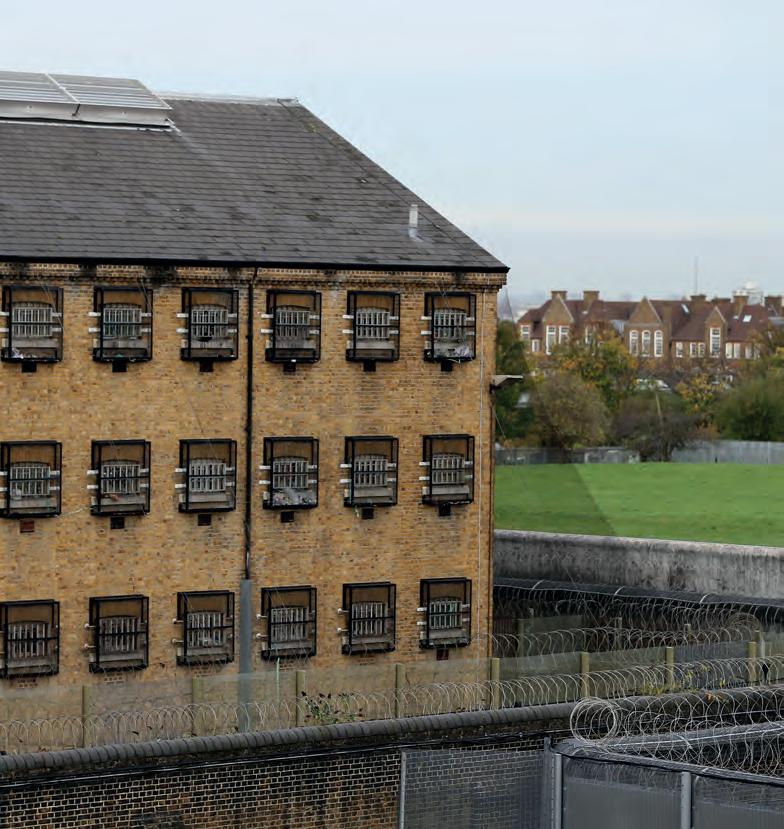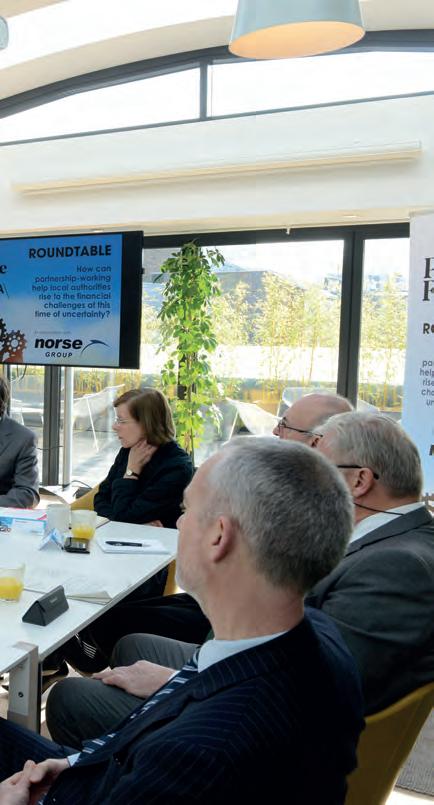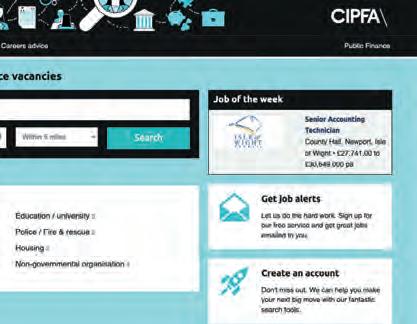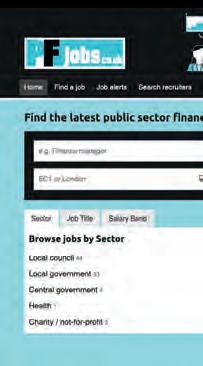IS THE PARTY OVER?
The UK says it wants a conscious uncoupling from China. But at what cost?

BEAUTIFUL GAME
Corruption has tainted football’s image, but new governance is in the offing
ALL SHOPPED OUT?
Why there’s hope for the high street despite a three-pronged attack
CARBON CHALLENGE
The rocky road to meeting net-zero targets
THE JOURNAL FOR THE CHARTERED INSTITUTE OF PUBLIC FINANCE & ACCOUNTANCY MARCH/APRIL 2023 PUBLICFINANCE.CO.UK
Gain a clear understanding of how your frontline services are performing to make robust and sustainable decisions. With a comprehensive collection of dashboards spanning a range of frontline services, CIPFAstats+ gives you access to powerful data insights
well as community outcomes.
New for the 2023/24 subscription year: new dashboards will be added to cover the following areas, Levelling up, Cost of Living, and Grants.
We will be enhancing the quality of the analysis across all our dashboards by the inclusion of new statistical techniques, visualisations and key indicators. And, for
historical data Predictive Analytics will be included, using machine learning algorithms , to build a model capable of generating evidence-based, robust predictions of a

Book your demo visit cipfa.org/services/cipfastats
email customerservices@cipfa.org
call +44 (0) 20 7543 5600
Redactive Publishing Ltd, 9 Dallington Street, London EC1V 0LN publicfinance.co.uk @public_finance_
EDITOR
Chris Smith 020 7324 2796 chris.smith@publicfinance.co.uk
GROUP EDITOR
Jon Watkins 020 7324 2788 jon.watkins@publicfinance.co.uk
REPORTERS
Oliver Rudgewick 020 7324 2768 oliver.rudgewick@publicfinance.co.uk

Calum Rutter 020 7324 2794 calum.rutter@publicfinance.co.uk
SUB-EDITOR
Caroline Taylor caroline.taylor@redactive.co.uk
LEAD DESIGNER
David Twardawa 020 7324 2704 david.twardawa@redactive.co.uk
PICTURE EDITOR
Claire Echavarry 020 7324 2701 claire.echavarry@redactive.co.uk
SENIOR DIGITAL CONTENT EXECUTIVE
Daniel Kelly 020 7324 2745 daniel.kelly@redactive.co.uk
SALES
020 7880 6203 advertising@publicfinance.co.uk
RECRUITMENT SALES
020 7880 7621 pfjobs@redactive.co.uk
PRODUCTION MANAGER
Aysha Miah-Edwards 020 7880 6241 aysha.miah@redactive.co.uk

ACCOUNT DIRECTOR
Joanna Marsh 020 7880 8542 joanna.marsh@redactive.co.uk
PRINTING
Warners Midlands
To subscribe to Public Finance at the annual UK cost of £100, call 01580 883844 or email subs@redactive.co.uk. International annual subscriptions are in the £130-£205 range.
Public Finance is editorially autonomous and the opinions expressed are not those of CIPFA or of contributors’ employing organisations, unless expressly stated. Public Finance reserves the copyright in all published articles, which may not be reproduced in whole or in part without permission. Public Finance is published for CIPFA by Redactive Publishing Ltd.

Public Finance, Redactive Publishing Ltd, 9 Dallington Street, London EC1V 0LN
ISSN 1352-9250
CHRIS SMITH
Plusça change…
The more things change, the more they stay the same. The 1849 quotation from French writer Jean-Baptiste Alphonse Karr is the central theme to this edition of PF, and we’re daring to be optimistic about the future. We’re thinking how challenges evolve over time and how we respond to them. If you were around in the 1970s and early ’80s, you’ll recall TV news reels about the trial of the Gang of Four in China and the Cultural Revolution.
In just a few short years, what was a country largely closed to the West became a central part of our lives. Has the Great Unravelling begun? The prime minister seems to think so, and that has implications for public finances. So we’re considering if it is more complicated than a trade spat.
Tel: 020 7543 5600 Fax: 020 7543 5700
Email: corporate@cipfa.org
Address: CIPFA, 77 Mansell Street, London E1 8AN
We want to know what visionary projects look like, and have been privileged to find out more about how The Clink Charity is breaking the cycle of offending.
The high street also needs some inspiration, because its future is critical for communities across the UK – as well as public sector balance sheets. Internet shopping isn’t sustainable, and small traders – which make up the majority of UK employers – can’t do it all themselves.
Average circulation
13,428
(Jul 19–Jun 20)
In an earlier life, I was part of a team working on a regeneration project backed by Chinese investment. It didn’t materialise, and a new backer is now being sought – in all probability, a property developer. The local community remains left behind, and there has been no attempt to enable them to create the science or engineering start-ups we badly need. The project and the UK are in no-man’s land.
Later in the edition, we go back in time. Our quest to find the oldest copy of PF brought a response from John Harker, who shared his edition from 1976. War was driving uncertainty, a Democrat president was setting his agenda in the US, and Britain was in financial crisis. Sound familiar?
John shares how public services responded, as well as some familiar issues – reporting standards were a concern. He reminds us that we’ve been here before and got through it. We can do the same again.
I hope you enjoy the edition.
CHRIS SMITH Editor chris.smith@publicfinance.co.uk
PUBLICFINANCE.CO.UK 3 EDITORIAL WELCOME
Best Magazine Launch or Re-launch Memcom Membership Excellence Awards 2021 Best Association Magazine (circulation under 25,000) The Association Excellence Awards 2021
In 1976, war was driving uncertainty, a Democrat president was setting his agenda in the US, and Britain was in financial crisis. Sound familiar?
Health and care integration is not a new phenomenon but has been a constant and
Over time, integration has moved from voluntary partnerships with no formal accountabilities. The Health and Care Act 2022 (the Act) put integrated care systems (ICSs) on a statutory footing, and provides a legislative framework that moves away from competition in the NHS and aims to better support collaboration and partnership working.

CIPFA believes that for integration to be a success, a whole systems approach to public
Our recent publication, Integrating care: policy, principles and practice for places, aims to support such an approach. It provides an overview of the changes as a result of the Act and what integration is seeking to achieve.
CIPFA’s Integrating care: policy, principles and practice for places is available as a free download on the CIPFA website.
Learn more: visit cipfa.org/services/integrating-care email customerservices@cipfa.org
call +44 (0) 20 7543 5600
NEED TO KNOW

7







reoffending, asks The Clink Charity CEO





























34 Whole new ball game
New governance aims to address corruption and bribery in football
40 High hopes

What does the future hold for the high street?

48 In it together
A PF round table explores strategies to navigate the challenges ahead




IN PRACTICE
20




Why


PUBLICFINANCE.CO.UK 5
Catch up CIPFA to review atrisk councils; Treasury spending controls
News analysis Cost of going green; children’s services reform
News analysis Indian infrastructure boost; Ukrainian budget
Big picture Germany ‘frees the leopard’ for Ukraine
Campaign
World in numbers
Safety at stake
NHS estate is crying out for capital investment
The Chinese way There are lessons we could learn from China 39 Governing by committee CfGS takes another look at the committee system 45 Play list Buildings that boost quality of life IN
10
12
14
16
17
OPINION 19
The
25
DEPTH
Exit the dragon?
UK may be ‘standing up to’ China, but how much
political rhetoric?
Interview
The
is
28
CONTENTS MARCH / APRIL 2023
won’t the UK fund services proven to reduce
55 Radical thinking Carbon pricing solutions
57 Social fix Integrating health and social care
houses? The building safety levy
Déjà vu
Pensions
LGPS
58 Safe as
59
1970s local government 60
Three vital updates for
schemes
and careers Crypto roles at Treasury
Speak easy Encouraging staff views
Events
On account
police finance
Last word 28 40 34 63 20
61 Jobs
63
64
65
Improving
66
Robust and compliant procurement is key in the delivery of public services as organisations need to meet statutory obligations and deliver value for money for taxpayers. CIPFA is committed to helping public sector organisations reduce the costs and risks associated with procurement to improve outcomes. We offer:
• Advisory and consultancy: CIPFA offers end-to-end support for systems, outsourcing and service procurement –from market testing and business case and selection.

• Lifelong learning: CIPFA offers several training courses to help upskill staff and strengthen good procurement and contract management practices.
• CIPFA Procurement and Commissioning Network (CPCN): The CPCN is a leading and popular forum for public sector procurement practitioners, offering valuable guidance, updates, networking and training on a wide range of procurement areas.
• CIPFA Property Networks: Whether building homes, hospitals, schools or roads, CIPFA’s property networks will keep you up-to-date with the latest thinking, helping you with your procurement journey.
Find out more: contact us to discuss how we can help you tackle your procurement challenges.
visit email chris.tidswell@cipfa.org call
p9
WHITEHALL POWERPLAY
‘Levelling up’ could fall prey to capital spending restrictions





p11 GANG CULTURE
Kids in care remain vulnerable despite service reforms

INSPECTION CIPFA reviews set to tighten intervention process

 By Calum Rutter
By Calum Rutter
The government has chosen CIPFA to scrutinise select councils’ finances and governance, to inform any intervention it then decides to make.






The institute, along with Grant Thornton and the Good Governance Institute, will carry out “targeted external assurance reviews”, aiming
p13
‘ZERO-TOLERANCE’
Ukraine targets corruption as it budgets for rebuilding
to present a comprehensive picture of the challenges, risks and issues local authorities are facing, revealed the Department for Levelling Up, Housing & Communities. These will include the impact of rising inflation, economic uncertainty, increased service demand and the continuing effects of Covid-19.

PUBLICFINANCE.CO.UK 7 NEWS / ANALYSIS / OPINION / DEBATE
Photography: Alamy
CIPFA confirmed that its programme is separate from its discussions with Warrington Borough Council
CATCH UP
MARKETS QUESTION BANK OF ENGLAND DIRECTION
Reductions in some long-term gilt yields have come despite Bank of England interest rates hikes. David Blake, director at treasury adviser Arlingclose, told PF: “The assessment from the markets was that the [Bank] might end up over-egging the pudding, putting rates up to too high and having to correct them.”
The evidence gathered will inform any further actions DLUHC believes are necessary.
“Local authorities are no exception [to the pressures on the entire public sector] and are facing some tough challenges as they continue to deliver their essential services in very difficult circumstances,” said CIPFA chief executive Rob Whiteman.
“I am really pleased that CIPFA has been chosen as the lead reviewer, which is a testament to our expertise around financial management in local government.
“As ever, we remain committed to the public sector, and I hope that these reviews will bring about positive outcomes for those involved.”
CIPFA confirmed that the programme is separate from the recently announced discussions set to take place between the institute and Warrington Borough Council.

“The financial sustainability of many councils remains precarious, and local leaders are facing myriad challenges, including double-figure inflation, rising
interest rates and growing demand for services,” said Phillip Woolley, partner and head of public sector consulting at Grant Thornton.
“This work represents an important step in ensuring there is a collective plan across both central and local government for helping those who are most at risk.”
Professor Andrew Corbett-Nolan, chief executive of the Good Governance
Institute, said that governance is the key to financial recovery at challenged councils.
“The reviews will help local authorities establish a platform to build on and enable them to better service their local communities, while at the same time dealing with pressing financial issues,” he said.
The government also announced that CIPFA would be reviewing Eastleigh Borough Council in Hampshire for potential “excessive risk” from debt.
The council gets income from commercial interests, including a DIY store and a sports ground.
Local government minister Lee Rowley said: “The council remains one of those with [a] larger amount of debt... and a reliance on commercial income.”
INTERNATIONAL
Pension reforms look uncertain for France
Attempts by the French government to reform pensions have met stiff resistance.

More than 750,000 people took to the streets across the country in February during three days of action against plans to
Dateline move for valuations criticised
raise the retirement age from 62 to 64. It followed a national walkout in January, when a million people protested.
Public transport and oil refinery deliveries were part of the disruption, aimed at challenging president Emmanuel Macron. The action was timed to coincide with government debates on the legislation.
Parliamentary arithmetic – and striker numbers – will clinch the issue, as the president lacks a working majority, with opposition from left- and right-wing parties.
Government proposals to move the date for annual Local Government Pension Scheme valuations just weeks before they take place will create further administrative burdens for funds, experts have said.
Under LGPS regulations, pension scheme members face paying more in tax if the change in their pension value exceeds a yearly limit set by HMRC.
Currently, funds calculate yearly changes in pension values based on annual CPI inflation from the previous September
– and apply these changes on 1 April. But HMRC currently calculates its allowance on 6 April, based on CPI inflation from the previous September.
Ian Colvin, head of LGPS benefit consultancy at pensions consultancy Hymans Robertson, said: “Matching the dates up does make sense. But the concern for me now is the timescale. We have a twoweek consultation and then all the LGPS funds will have to update their systems to make this change.”
8 PUBLIC FINANCE MARCH/APRIL 2023
NEED TO KNOW
This work represents an important step in ensuring there is a collective plan
PENSIONS
IN BRIEF
Treasury power grab will hit ‘ levelling up’
By Oliver Rudgewick
Capital spending restrictions imposed on the Department for Levelling Up, Housing & Communities will hamper local authority investment and harm the government’s flagship policy, experts have warned. The Treasury has barred DLUHC from approving new capital spending without its sign-off.

A DLUHC spokesperson told PF that robust spending controls are a normal way for the government to ensure departments are delivering value for money: “The government’s central mission is to level up every part of the UK by spreading opportunity, empowering local leaders and improving public services. DLUHC will continue to deliver its existing programme of capital projects as planned.”
Zoë Billingham, director of thinktank IPPR North, said the move puts the Treasury “firmly in the driving seat for many decisions on ‘levelling up’”.
“The Treasury has been on a go-slow on ‘levelling up’, so this is concerning
for what is electorally still the government’s flagship agenda,” she said.
“For councils, this will likely mean delays on funding decisions, but what this really points to is the impact of central government taking decisions that should be held locally. Citizens should not have to wait to have basic housing improvements because of Whitehall powerplay.”
Jonathan Werran, chief executive of local government think-tank Localis, told PF that the decision marks a breakdown in trust between the Treasury and DLUHC, but said the announcement overshadows wider financing issues that councils are facing in meeting their capital needs.
“It does betoken a need to have a more sustainable long-term means of investing in place,” Werran said.
“It is stopping a route of capital finance for local authorities, which isn’t the entire answer, but, with the patchwork of funding needs, might be a significant gap in the defences.”
Residents take hit for financial failures
Allowing three struggling local authorities to raise council tax beyond the normal limit only pushes the cost of their failure onto residents, experts have said.
Thurrock and Slough will be able to increase council tax by an extra 5%, and Croydon by 10%, on top of the standard 5% rise already allowed next year, without triggering a referendum.
“Council tax payers suffer, but it is central departments that dropped the ball,” said PAC chair Meg Hillier.
Scotland targets higher earners for tax increases
Scottish government proposals for increasing taxes on higher earners to fund more generous benefits are more progressive than in the rest of the UK, but are at risk of being avoided, the Institute for Fiscal Studies has warned.
The draft 2023-24 budget proposed increasing the top two rates of income tax by 1p per pound, to 42% and 47% respectively, and freezing the majority of tax bands.
Hong Kong lures tourists with free flights
The Hong Kong government is set to give away 500,000 free air tickets from March in a bid to entice visitors.
The ‘Hello Hong Kong’ campaign will run for six months and will cost HK$255m directly, with a further HK$100m spent on promotion.
After the Covid-19 lockdown and high-profile demonstrations against the government, the country’s tourist trade has suffered.
PUBLICFINANCE.CO.UK 9
Photography: Getty
WHITEHALL
TACKLING CLIMATE CHANGE
It’s not easy being green
The political and financial costs of meeting net-zero targets are becoming
By Oliver Rudgewick and Chris Smith
Indications of the challenges ahead in reducing carbon emissions have emerged as work gets under way to meet the legal target of net zero by 2045.
1 Political wrangling over UK delivery has begun
The UK government announced the creation of a new Department for Energy Security & Net Zero, tasked with securing our long-term energy supply.
Prime minister Rishi Sunak said: “The move recognises the need to secure
clear
more energy from domestic nuclear and renewable sources as we seize the opportunities of net zero.”
But two Conservative mayors, Andy Street and Ben Houchen, said devolving more money was the way to create more green jobs.
“This is about pounds, shillings and pence as much as environmentalism,” said Street.
And Whitehall expert Jill Rutter warned that curbing the Treasury’s power had to come first.
She said: “[I’m] not clear this is the answer if you
are serious about energy and climate change. The Department of Energy & Climate Change made a lot of progress decarbonising power, but was too weak to influence beyond that.”
4 Infrastructure reboot is too slow
Campaigners and industry argue that the pace of green energy development is glacial. In England, just two wind farms were built last year, generating less than 1MW.
2
Behavioural change in a city isn’t easy New York has started phasing out natural gas from housing developments – and that could move domestic markets.
New York governor Kathy Hochul passed a bill that effectively bans gas in new buildings, starting in 2024 for those under seven stories and in 2027 for anything taller.

The New York Post claimed the ban “would affect oldtimers and millennials, who are obsessed with castiron pans”. A 70-year-old Brooklyn resident told the paper: “We lost electricity… during Hurricane Sandy. The only thing we had to heat up our food was gas. What if that happens again?”
3
Scotland the brave?
Cannock Chase District Council changed its netzero goal from ensuring the entire area was carbon-neutral by 2030 to simply the authority’s own operations, because a report estimated that the former would need more than £4bn of investment.
Scotland’s net zero, energy and transport committee said that while councils are best placed to fight climate change, wider funding constraints are seeing authorities prioritise resources to support services.
The Energy Networks Association revealed that up to 600 projects in England and Wales, with a combined capacity of 176GW, are waiting to be connected to the National Grid – up to 2036.
“Nobody can hold a project for that long,” said one industry insider.
5 Clean air brings a filthy row
The capital’s streets are gridlocked, but plans to charge motorists with older cars are deadlocked.
The Ultra-Low Emissions Zone expansion has turned into a flashpoint for London mayor Sadiq Khan. He wants the scheme live in August, but 11 London boroughs are either against the expansion or are calling for a delay. A court battle looks likely, a protest group has formed, and there was even a petition for a referendum.
Harrow leader Paul Osborn shared his concerns for the future of ULEZ if the expansion is given the green light, suggesting that it would be unwise to move ahead with the plans amid the cost-of-living crisis.
“Expanding the zone when inflation is at 10%, when energy bills are going up, when fuel bills are going up, when people’s food prices are going up; it’s not the right time to do it – even if it was the right solution,” he said.
10 PUBLIC FINANCE MARCH/APRIL 2023 NEED TO KNOW NEWS ANALYSIS
New York state will phase in a ban on gas in new buildings, starting in 2024
This is about pounds, shillings and pence as much as environmentalism
Reforms fail to tackle gang exploitation of kids in care
By Oliver Rudgewick
Children in care remain at risk of gang exploitation unless the government develops a clear plan to effectively regulate private care providers, an expert has said.
The UK government’s children’s social care implementation strategy proposed greater financial oversight of providers. But it also risks reversing progress made on removing gang influence over homes.
The plan outlined spending of £200m by 2025 on improving sector pay, hiring more social workers and piloting new family help services.
However, Sarah Parker, research and development officer at youth charity Catch22, criticised the plan, saying it lacked changes to the oversight of homes, which is key to reducing child exploitation.
More than 2,000 county lines are operating across the UK, according to the National Crime Agency
90% of English police forces have seen county lines activity in their area
27,000 young people are involved in county lines (Home Office), including 4,000 teenagers in London alone (Children’s Society)
“This strategy is a missed opportunity,” she said.
“There is a huge issue with insufficiency, both in terms of foster carers and appropriate accommodation.
“Preventing gangs from targeting vulnerable children is hard; as long as a child has a phone in their hand, they are accessible to people who wish to harm or exploit them.
“This is why children require care up to the age of 18, and some unregulated accommodation falls woefully short of that.”
Parker said the lack of funding to support mental health and exit from care is also harming the ability to tackle gang influence.
“[Young people] also need greater material and emotional support, and access to services and opportunities such as financial advice or help finding work,” she said.
Analogue shift
According to the National Youth Agency, the data on child exploitation reveals changes .
During lockdown, police operations shut down 102 lines. “But child criminal exploitation continues,” warned the NYA.
After their EncroChat phones were compromised, organised crime gangs have shifted to handwritten notes and verbal communication. Phones are for foot soldiers. And recruitment has diversified in both social media platforms and types of young people.
The NYA thinks the solution is analogue: “Detached and outreach workers know their area, and the young people in them, and are best placed to identify and respond to the changes in county lines.”

“This is particularly true when it comes to living semiindependently.”
Exploitation of children in care has become more prevalent in recent years, and the Children’s Society said the cost-of-living crisis could put more people in danger.
Research from the charity showed that 51,000 children’s bank accounts were used for fraud in 2021 – a 21% increase on the previous year.
The National Police Chiefs’ Council said fighting county lines crime remains a top priority, including prevention and safeguarding work.
NEED TO KNOW NEWS ANALYSIS
PUBLICFINANCE.CO.UK 11
Photography: Alamy, iStock
FACT FILE
CHILDREN’S SERVICES
Reforms to children’s social care are a missed opportunity – and won’t stop ‘exploitation’, experts say
India’s government has set its sights on a major building programme to overhaul infrastructure and meet net-zero targets.
In her Budget speech, finance minister Nirmala Sitharaman set a capital budget of INR10trn (£99bn) next year – a 33% year-onyear rise, and equal to 3.3% of gross domestic product.
The 2023-24 Budget has outlined INR35trn (£347bn) of revenue spending, with the Ministry of Defence set to receive the most funding at INR6trn (£59bn).
She said the Budget proposals mean capital spending will have tripled since 2019-20, adding that the investment will stimulate growth and “cushion against global headwinds”.
“Investments in infrastructure and productive capacity have a large multiplier impact on growth and employment,” Sitharaman said.
“After the subdued period of the pandemic, private investments are growing again. The Budget takes the lead once again to ramp
India goes for growth with infrastructure boost
this year – India’s fiscal year ends in March. This will reduce to 5.9% next year, before contracting further to 4.5% by 2025-26.
Investment in the transition to net zero will also ramp up next year, including a ‘green credit programme’ to encourage the use of renewables and carbon reduction by businesses and local bodies.
The Budget includes INR350bn (£3.4bn) of priority capital funding towards renewable energy and energy security.
By Oliver Rudgewick and Chris Smith
up the virtuous cycle of investment and job creation.”
Sitharaman announced that up to INR1.3trn (£12.8bn) has been set aside in 50-year, interest-free loans to state governments to “spur investment” in infrastructure.
It is a critical issue. S&P Global Ratings highlighted
March of the makers
Manufacturing is back. President Biden has focused the US budget on supporting makers, and India is doing the same.
S&P Global Ratings projects India’s GDP to grow around 8% for the next three fiscal years. The Indian government will significantly boost the manufacturing sector to contribute about
25% of GDP by 2025, from below 16% currently.
The shift comes as China moves toward consumption-led growth.
But it won’t come cheap – the Indian government estimates that it requires US$1.5trn in infrastructure investments over the next decade.
See cover story, p20
warnings from experts that corporate growth is being held back by an infrastructure deficit. Part of the problem is a cost of up to 5% of GDP resulting from inefficiencies.
Under the proposals, states will have to spend the funds in 2023-24 on new police stations, libraries and digital infrastructure. They will be allowed a fiscal deficit of 3.5% of their GDP, of which 0.5% will be tied to power sector reforms, the Budget stipulates.
Sitharaman also announced tax cuts for the “hard-working middle class” just over a year before the general elections in April and May 2024. The government has proposed lowering the top rate of tax from 42.7% to 39%.
Ministers have forecast a fiscal deficit of 6.4% of GDP
The announcement coincided with the opening of the first stages of a £10.8bn expressway to link Delhi with Mumbai. The route will ultimately cut road travel down to 12 hours.

But it also signals India’s intention to catch up with geo-political rival China.
That point hasn’t been missed by investors, as S&P Global Ratings pointed out in a recent report: “India’s ambition of sustaining its relatively high growth depends on one important factor – infrastructure. The country, however, is plagued with a weak infrastructure, incapable of meeting the needs of a growing economy and growing population.”
It added: “Timely execution of projects within budgeted costs will be a key challenge, even if funding is available for economically viable projects.
“Power generation and transmission are improving, but transportation infrastructure capacity constraints continue to limit corporate performance and investments.”
12 PUBLIC FINANCE SEPTEMBER/OCTOBER 2020
MARCH/APRIL 2023 NEED TO KNOW NEWS
ANALYSIS
Photography: Getty INFRASTRUCTURE
The Indian government is raising capital spending in 2023-24, in a bid to ‘ramp up the virtuous cycle of investment and job creation’
$9bn

The approximate amount of international aid money needed by Ukraine to keep its government and military operating each month
Ukraine sets sights on the future and purges graft
needed to quicken. Nato secretarygeneral Jens Stoltenberg said delivery of military assistance to Ukraine should be expedited.
Alongside the plea to world leaders from Ukraine to continue their financial support came a visible sign that graft was also going to be tackled.
Zelenskyy acts
Rumours of money not reaching its intended projects were answered with a series of high-profile and swift sackings.


 By Oliver Rudgewick and Chris Smith
By Oliver Rudgewick and Chris Smith
The Ukrainian government has earmarked a major tranche of new spending for small businesses and crumbling infrastructure, while targeting corruption infrastructure, and this figure would rise to $15bn to meet European best practices.

The Ukrainian parliament has approved an amended Budget bill, earmarking an additional UAH10bn (£224m) in loans, grants and credit funds this year.

The Ministry of Finance will allocate more than UAH4.5bn (£101m) to help renew rolling railway stock, and repair the airfield and energy infrastructure at Lviv airport.
More than UAH2.5bn (£56m) will be used to rebuild and modernise hospitals and bridge infrastructure, and a further UAH1.3bn (£29m) will provide grants for small and micro-businesses.
The remainder of the funding will be spent on improved border checks and partial loan guarantees for farmers.
A year on from the Russian invasion, Ukraine said it needs around $9bn of aid per month to fund its military and keep government services running.

Part of this would go to creating a universal basic income for all Ukrainians, to helping people who have lost their jobs and to providing emergency accommodation for the homeless.
President Volodymyr Zelenskyy made his first state visits to the UK and France, aiming to garner further financial support.
His ministers said it would cost $6.4bn to repair and rebuild damaged medical
The Ministry of Health said its draft Healthcare Infrastructure Recovery Plan will prioritise rebuilding hospitals, improving mental health and rehabilitation services to ensure they are compliant with EU legislation.
Deputy health minister Ihor Kuzin said: “During the past year, we have been synchronising with international partners to move in unison on the restoration of the healthcare system and to coordinate the technical support from various international sources.
Fighting intensifies

The focus on rebuilding came despite intensified fighting, particularly around Bakhmut, and indications that Russia was readying for a spring offensive.


Western military leaders made clear that the pace of support from allied countries
President Zelenskyy announced the departure of Ruslan Dziuba as deputy commander of the National Guard.
It was announced in a decree issued by the president’s office and did not come with an explanation.



Zelenskyy had already made clear that the Defence Ministry needed to get a handle on where money was going to ensure corruption didn’t hand the military advantage to Russia – or upset international donors.
The ministry revealed that audits had led to hundreds of officials being disciplined for failings.
The president said: “The purity of the work of state structures must be guaranteed.”
NEED TO KNOW NEWS ANALYSIS
PUBLICFINANCE.CO.UK 13
UKRAINE
Leopards change Germany’s spots
Asmall number made a historic change for Germany.
The country’s post-war reluctance to be drawn into battles ended with an historic Zeitenwende or turning point – the decision to send 14 Leopard 2 tanks to Ukraine ahead of a likely spring offensive by Russia.
It followed days of soul-searching among the country’s politicians – and relentless pressure from Poland and other EU countries that wanted to send some of their German-made Leopard 2 tanks under licence.
The announcement came after an allied summit in January at Ramstein airbase failed to get agreement. In response came a wave of protests across Germany, urging the government to ‘Free the Leopard’.

German chancellor Olaf Scholz faced a tough decision. His SPD party has historically respected Russia and been suspicious of Nato. The country’s leaders have been mindful of its history in military involvement since the Second World War. Some politicians raised fears of a Russian escalation.
A deciding factor was a missile strike on a Ukrainian apartment block, killing dozens of civilians. A government spokesman said the decision “follows our well-known line of supporting Ukraine to the best of our ability”.
As well as Poland, the US is sending at least 30 M1 Abrams tanks – part of a fresh $2.5bn support package – and the UK is sending 14 Challenger 2 tanks.
Russia’s response was that the tanks would “burn like all the rest”.
Photography: Getty 14 PUBLIC FINANCE MARCH/APRIL 2023 NEED TO KNOW BIG PICTURE
UKRAINE

PUBLICFINANCE.CO.UK 15
Counting the cost: online safety
Unlimited social media access is risking lives and costing money. Ministers are under pressure to act
Police chiefs have urged ministers to place a legal duty on tech firms to prevent livestreaming during a major incident.
PF understands the government is being asked to include a ‘Christchurch clause’ in its online safety legislation, which would prevent terrorists broadcasting on social media. It is named after the 2019 atrocity in New Zealand, in which 51 people died.
It is part of the ongoing negotiations with politicians and the legislation team at the Department for Culture, Media & Sport. The Online Safety Bill received its second reading in the House of Lords on 1 February.
Campaigners, including the Molly Rose Foundation, want tech firms to face penalties if they don’t restrict access to harmful online material. The charity is named after Molly Russell, who was 14 when she committed suicide after viewing content directed to her by web algorithms.
Her father, Ian, said the material would not have been published by the traditional media: “This harrowing content was reviewed during last year’s inquest into Molly’s death by a child psychiatrist, who described it as ‘very disturbing’.
“I have never met a parent who has been happy with their child viewing this kind of content. It drove my daughter to take her own life.”
The cost of online harm is estimated to be £365m a year, but PF has urged DCMS to calculate an accurate figure for the cost placed on the public sector.
Police forces are warning that unrestricted livestreaming is a security risk and that broadcasts could affect future trials –as well as posing a trauma risk. A case is being investigated where a defendant livestreamed sentencing from their phone, despite legal restrictions.
MEDIA Agenda: Whitehall funding
Council budget negotiations and ‘levellingup’ announcements put local funding on the agenda at the start of the year.
PF responded to an article in the FT on regional funding in January with a letter that was published in full.
The FT rightly pointed out local communities have almost no say in funding decisions that affect the places where they live.
PF argued there are alternatives to the current funding system, which dates back to the poll tax
era - not least, the option of giving people the chance to invest in their own communities.
We said: “The biggest stumbling block… is that most local challenges involve every agency: councils, the NHS, policing and education. The current approach leaves no time or money for problem-solving.
“Some councils can weather the storm because they have reserves or [are] fêted with favourable grants from central government to keep them on side.”
Read our full opinion at publicfinance.co.uk
Comment: editorial@publicfinance.co.uk
GOVERNANCE
Why auditors matter
The sector has a shortage of people trained in treasury roles. Addressing this shortfall is critical for timely reporting of accounts and to prevent public sector organisations from being damaged by financial losses. We are backing CIPFA’s call for urgent government action to increase recruitment. In January, Grant Thornton published a report into governance at Cheshire East Council up until 2015. The auditor said the costs of governance failures were serious.
Grant Thornton said: “In our view, there remains a public interest in these matters being aired publicly and analysed, both for accountability purposes for the local electorate and more widely to identify the underlying causes for the benefit of the local government sector as a whole.”
LEGISLATION
IF
ASKED
Is
public sector debt bad?
“The state can usually cope with more debt as it grows richer, just like you”
NEED TO KNOW CAMPAIGN 16 PUBLIC FINANCE MARCH/APRIL 2023
Michael Blastland and Andrew Dilnot, BBC review of taxation, public spending, government borrowing and debt reporting
This kind of content… drove my daughter to take her own life
$84BN
£4BN
$29BN
€8.266
The total assets of euro area insurance corporations, according to the European Central Bank.
73.2%
The OECD labour force participation rate, stable in the third quarter of 2022 – the highest level since 2008.
The number of Leopard 2 tanks being sent to Ukraine by Germany.
PUBLICFINANCE.CO.UK 17
NEED TO KNOW WORLD IN NUMBERS
TRILLION
WORLD
IN NUMBERS
14
Expected growth in the used goods market by 2030, according to a GlobalData consumer survey. 5M
The valuation of ChatGPT, the AI language software that mimics human conversation.
The estimated cost for Cannock Chase District Council of meeting its net-zero goal by 2030.
The age of Britain’s oldest lorry driver.
90
The number of Ukrainian children whose education has been affected by war.
Digital transformation in treasury management


Digitisation is touching all aspects of our lives, so it’s no surprise that it is now set to transform and improve treasury management

Optimising cash balances, controlling costs and improving efficiencies are all key responsibilities for any treasury team. Years of cost-cutting, resource constraints and hybrid working have made the treasury team’s role even more challenging. In this article, we examine the current landscape and how technology can enable treasury teams to achieve efficiencies, cost savings, reduce risk and ensure best practice.
Treasury managers undoubtedly play a crucial role within their authorities. For most, their modus operandi has remained unchanged; namely ensuring sufficient liquidity is available and that liquidity is managed actively and securely. Money market trades are normally executed with a small number of trusted counterparties or relationship banks; these are then confirmed and reconciled manually. This all takes time, introduces operational risks and is inefficient. Additionally, this old process means you are not optimising the returns available, since money markets are opaque with no clear picture of pricing and depth to make informed decisions.
Ask yourself a few basic questions. How do you get your information currently? Can you rely on that information? What is the cost of actually dealing? Are you getting the best price available to you?
Recognising these challenges and the value of timely information in treasury operations, platforms such as Munix have been developed to solve those questions. They give direct access to live money market pricing and depth of market without incurring the high costs of vendors such as Bloomberg or Reuters.


Full disclosure in terms of price, size and approved counterparties enables you to make informed pre-trade decisions. Chat functionality and electronic notifications enable you to digitise the dealing process, while electronic trade confirmations ensure full compliance and immutable record keeping. Email connectivity across your whole team keeps everyone informed and ensures the post-trade environment is smooth and efficient while also reducing operational risk. Platforms improve efficiency, both in time spent and by positively impacting workflow across the dealing cycle.

It is therefore not surprising that expectations of improved treasury management in the form of best execution
and reduction of operational risk are front and centre in the minds of Section 151 officers. This means transparency, choice and straight-through processing are becoming more important than ever. Furthermore, in this time of remote working, audibility and security are key to ensure the orderly conduct of business away from the office. Munix and similar platforms solve many of these issues and will add value to your daily finance operations.
For more information, contact Munix at info@munix.co.uk


PARTNER CONTENT
SAFFRON CORDERY
Fixing the roof is critical for more than patients
Strikes by nurses and ambulance workers have laid bare the effect on many NHS staff of longstanding, severe pressures right across our health and care system.
Trust leaders were already geared up for a tough winter – always the most difficult time of year – and many feared it could be the worst they’ve ever seen. So it is proving.
And while they and their staff pull out all the stops to ensure patient safety amid industrial action and soaring demand for overstretched services, they have to contend with underlying issues that have caused concern for years.
Capital is one of those fundamental problems. The very fabric of the NHS – its estate – is coming apart at the seams, leaving trusts ill-equipped to do everything that NHS England and the government ask of them.
Major operational and strategic capital investment is needed, not least to tackle the £10.2bn maintenance backlog across the NHS. Far too many buildings and facilities are in a bad state, and the latest figures show that things are getting worse as the costs of trying to patch up creaking infrastructure mount. The maintenance backlog has grown by 11 % in a year, and more than half of it poses a ‘high and significant risk’.
“We operate 21st-century healthcare from 19th-century buildings – increasingly unsustainable.” That’s what one NHS leader said, responding to an NHS Providers survey of trusts

included in the government’s New Hospital Programme (NHP).
The safety of patients and staff is at stake. Without proper funding, leaky roofs, obsolete equipment and ageing IT don’t get fixed or replaced, compromising quality of care.
Take mental health services, for example. A £677m maintenance backlog across mental health trusts is an unwelcome extra burden on overstretched services struggling with a record 1.8 million people in contact with them.
Another recent NHS Providers survey found that almost three in four mental health and learning disability trusts had trouble getting capital funding this financial year, and trusts reported a lack of prioritisation of mental health services in the bidding process.
It is vital that the pressing problems of capital investment in the NHS are addressed urgently. Trusts that need to replace unsafe, decades-old, reinforced lightweight concrete blocks in ceilings and walls are still waiting to hear from the government if they will get the necessary funding.
Shovels and picks at the ready, trusts in the NHP are poised to start construction but are still waiting for confirmation of funding. Those forced to delay for months have faced spiralling, inflationdriven increases in the cost of building materials, far above initial forecasts.
The NHP can transform a sizeable chunk of the NHS estate and the delivery of
healthcare by providing badly needed renewals for acute, mental health, community and ambulance services. But, throughout the NHS, there just isn’t enough capital funding available to invest in anything beyond business-asusual needs.
Major strategic capital investment has the potential to radically improve the NHS. Trust sites designed to support new models of care, digital transformation and clinical research can deliver measurable improvements in key health outcomes. And with the right level of investment, the NHS could play an even bigger role in turning the government’s net-zero and ‘levelling up’ ambitions into reality.
The NHS, its staff and patients need safe, efficient, reliable buildings and equipment, not wards where crumbling ceilings have to be propped up. If we don’t build modern, safe settings now, where staff can give patients first-class care, it will cost the NHS and the public purse dear for years to come.

Illustration: IKON
With the right capital investment, the NHS could meet netzero and ‘levelling up’ demands while keeping the UK healthy
PUBLICFINANCE.CO.UK 19 OPINION NHS
SAFFRON CORDERY is interim chief executive at NHS Providers
END OF A
GOLDEN ERA?
Wspace, shops and hundreds of new homes. But situations change.
For a while, the UK and China were the best of friends; that relationship has now firmly shifted into ‘it’s complicated’ territory.
In November, UK prime minister Rishi Sunak used his first foreign policy speech to announce that the “golden era” of British-Chinese relations was over.

hen it comes to failed regeneration projects, the Royal Albert Dock in East London is in a league of its own. The empty office blocks, barren wastelands and half-finished roads are more dystopian than anything a Hollywood film director could dream up.
Of course, it was never meant to be like this. When the scheme was announced in 2013 by then London mayor Boris Johnson and Newham mayor Sir Robin Wales, it was claimed the development would signal the dawn of a “golden era” of Sino-British relations.
The 35-acre site was handed over to Chinese developer Advanced Business Parks, which pledged to transform it with office
The prime minister declared that the closer economic ties of the previous decade had been “naïve”, and added that the UK would in future be “standing up with robust pragmatism” to the Chinese government.
Tough talk
The speech followed renewed pressure from some Conservative MPs for a tougher line with Beijing, following various concerns over security, human rights abuses and Chinese policies in Hong Kong and Xinjiang. But how much of the UK’s tougher stance on China is just the usual rough and tumble of political rhetoric? Has there really been a fundamental shift in Sino-British relations?
Dr Robyn Klingler-Vidra, associate dean at King’s Business School, King’s
FEATURE CHINA
WORDS JAMIE HAILSTONE PHOTOGRAPHY RICHARD GLEED
Whitehall may want to loosen ties with China, but it needs to balance that with trade and investment
20 PUBLIC FINANCE MARCH/APRIL 2023

PUBLICFINANCE.CO.UK 21
“The growth in UKChina trade stems from the strength of UK manufacturers and services, combined with the expanding Chinese middle class, and, by extension, the massive Chinese consumer market”
Dr Robyn Klingler-Vidra, King’s College London
Dr Jamie Gruffydd-Jones, University of Kent
College London, says the value of total trade between the UK and China is now nearly double what it was in 2012.
She adds that the UK is exporting high-value goods, such as cars, pharmaceuticals and scientific instruments to China. As the country starts to open up after the pandemic, we could see demand for travel services between the two nations grow again.
“The growth in UK-China trade stems from the strength of UK manufacturers and services, combined with the expanding Chinese middle class, and, by extension, the massive Chinese consumer market,” Klingler-Vidra tells PF
“The marked advance of China’s technology firms has also boosted the growth in trade volume and complexity.”
And Dr Jamie Gruffydd-Jones, a lecturer in politics and international relations at the University of Kent, argues that trade between the two nations remains “relatively healthy”, despite Brexit, Covid-19 and recent disputes over Huawei, although he notes there have not been any highlevel bilateral talks for a while.

He adds that the prime minister’s declaration should be seen as political rhetoric, as it is a line that will go down well with many Tory politicians and members.
“But there is a reason why it goes down well, which is that it does reflect a genuine shift in the way that politicians, the media and members of the public are talking and thinking about China –in a much more critical way than they were a few years ago,” he explains.
“This is not unique to the UK, but the shift in public attitudes towards China in Britain is dramatic – according to Pew Research Center surveys, 69% of British people have a negative view of the country – almost double the level in 2018,” says Gruffydd-Jones.
He adds that there is now a heightened political sensitivity around anything to do with Chinese
investment in the UK, particularly any projects with links to national security or human rights.
Going nuclear
Nuclear power is, of course, one such area. Back in 2015, China General Nuclear signed a strategic investment agreement to participate in three nuclear projects here – Hinkley Point C in Somerset, Sizewell C in Suffolk, and Bradwell B in Essex.
A key part of the deal was the implicit understanding that the UK government would support CGN’s plans to build its own Hualong One nuclear reactor in Bradwell B.
In February 2022, the Office for Nuclear Regulation and the Environment Agency approved the Hualong One reactor as suitable for construction in the UK.
But in November, then business secretary Grant Shapps told MPs that CGN had been bought out of its stake in Sizewell C and would no longer be involved in its future development.
Dr Paul Dorfman, who chairs the Nuclear Consulting Group and is an associate fellow at the University of Sussex Science Policy Research Unit, says it was an “appalling decision” back in 2015 to include China in the UK’s nuclear power plans.
“No other OECD country would let China anywhere near its critical nuclear infrastructure for reasons that have now become apparent,” he tells PF
“And those reasons are not simply China’s newfound aggressive tendencies,” he adds. “If you’re going to let China build its own reactor at Bradwell, then it will really be able to get into the guts of the UK’s nuclear energy infrastructure.”
At this point, there has been no confirmation that the Bradwell B reactor will go ahead, especially given the tensions between the UK and China. Meanwhile, construction work on Hinkley Point C remains ongoing.
“Trade between the two nations remains relatively healthy, despite Brexit, Covid-19 and recent disputes over Huawei, although there have not been any high-level bilateral talks for a while”
FEATURE CHINA
22 PUBLIC FINANCE MARCH/APRIL 2023
TRADE STATISTICS

Money talks
Figures from the then Department for International Trade show China remains Britain’s fourth largest trading partner, accounting for 6.3% of total UK trade in 2022.
In the 12 months to December 2022, total UK exports amounted to £27.9bn, up 1.9% or £509m on 2021. Imports from China totalled £65bn, down 3% or £2bn.
According to the latest official figures, the total amount of foreign direct investment in the UK from China in 2020 was £3.4bn. This accounted for 0.2% of total UK inward investment. However, given that this was the year that Covid-19 effectively shut the world down, maybe not too much should be read into that figure.
Surveillance
Another security concern is the widespread purchase and operation of CCTV systems from Chinese manufacturers Hikvision and Dahua.
Last year, an investigation by the campaign group Big Brother Watch found that 73% of British local authorities use CCTV cameras made by the two firms.
In November, the UK government ordered a halt to the installation of CCTV cameras supplied by the firms at sensitive sites.
Ministers have also been informed that all existing cameras will be disconnected from departmental core networks in Whitehall.
Madeleine Stone, legal and policy officer at Big Brother Watch, says while the government’s decision to end the deployment of the surveillance equipment is an important first step, the protection afforded to ministers and civil servants must be expanded to all of us.
“Our research has found that Chinese stateowned CCTV is used by over 60% of public bodies,” she adds.
A further example of the British government getting tough with foreign investors, including China, comes in the form of the National Security and Investment Act, which came into force in January 2022.
It covers 17 ‘sensitive’ areas, including computing communications, computing hardware and data infrastructure.

John Schmidt, a partner at law firm Arnold & Porter, London, says the primary focus of legislation is to address potential issues arising from economic activities of systemic rivals, particularly China and Russia.
“All prohibitions so far under the act relate to companies at least indirectly owned by companies or nationals from those two countries,” he adds.
“Out of the five deals blocked so far, one concerned an acquirer with links to Russia, with the other four involving Chinese or Chinesebacked acquirers.”
John Ferguson, practice lead, globalisation, trade and finance, at the consultancy Economist Impact, says the new law is not specifically aimed at Chinese investment, but it will provide a further barrier and deterrent.
He adds that UK businesses with links to China may also see their supply chains become more difficult to manage.
“For these businesses, there is already a shift under way to diversify suppliers away from an overreliance on Chinese companies,” he tells PF
“Countries like Vietnam are picking up a lot of these supply-chain shifts, along with other

PUBLICFINANCE.CO.UK 23
LIGHTS, CAMERA, ACTION
Screening out China’s story
Despite opening up to the West in the 1970s, China’s cultural output hasn’t reached the global big screens. Since 1979, it has put forward 36 films for the Oscars. Just two have been nominated; the last was Hero in 2002. None have ever won, although films about China have won Oscars.
The Last Emperor, released in 1987, won multiple awards. It was directed by Italy’s Bernardo Bertolucci, backed by a British
producer and made by a US film company. Then in 2000, Crouching Tiger, Hidden Dragon won Oscars for best foreign language film, best art direction, best original score and best cinematography. But it was backed by Sony, the Japanese entertainment giant.
Chloé Zhao won the Academy Award for best director for her film Nomadland
Ironically, films produced in Hong Kong have been more successful.
countries in South-East Asia. While this is a coherent strategy in the current geopolitical environment, it will be costly in the short term, as it takes time to find and develop new suppliers in these markets.”
Super power
But, as many experts have pointed out, ChineseBritish relations are also affected by other factors –namely, the economic and foreign policies of the US. Gruffydd-Jones argues that US pressure over Huawei effectively changed UK policy.

“A bipartisan hawkishness towards China in the US and subsequent effects on US-China relations cannot help but have a significant impact on how the UK media, public and policymakers see China,” he states.
Professor Guido Cozzi from the Institute of Economics at the University of St Gallen, Switzerland, says the US badly needs British and European partners to match China’s economic power, as its GDP is predicted to grow over the next two decades.
“The UK is critical because of its strong ties with the Indian subcontinent. India’s GDP will, by 2048, reach that of the US. Hence, its loyalty to the West must contain China’s influence worldwide.
“These geopolitical aspects [will] not eliminate trade and foreign direct investment flows. What is necessary, though, is the emancipation from an excess dependency on China. British multinationals [will] diversify and rely more on India, Pakistan and Bangladesh than on China,” adds Cozzi.
Domestic goods

















Closer to home, many local authorities will have slightly different and more urgent priorities in terms of securing funding for large-scale regeneration projects. In 2016, Birmingham City Council landed two property deals with Chinese investors, following trade missions to the Far East. In the same year, Nottingham City Council signed a five-year deal with counterparts in the Chinese city of Ningbo in a bid to become the UK’s ‘most China-friendly city’.
Nigel Wilcock, executive director at the Institute of Economic Development, says that, in many cases, foreign direct investment has provided tremendous benefits. He points to the Chinese investment through Envision AESC in Nissan’s new electric battery plant in Sunderland as the only “large-scale basis for UK automotive manufacturing electrification”.
However, he adds that growing uncertainty over the risk of some overseas investment capital coincides with UK financial institutions showing greater interest in investing in longer-term domestic projects. “Organisations such as Legal & General, Aviva and Triple Point are firmly behind the ‘levelling up’ agenda, making investments in locations where less spectacular but solid longterm returns may be generated,” states Wilcock.
Meanwhile, what is happening with the Royal Albert Dock scheme? In July last year, the Greater London Authority terminated its leasehold agreement with ABP to regenerate the site for failing to meet the obligations in the agreement.
At the same time, PwC appointed three joint liquidators of 23 companies within the ABP Group. Last month, it was reported that Irish property entrepreneur and champion jockey David Maxwell was in the process of buying the 700,000 sq ft first phase out of liquidation.
The remainder of the 35-acre site is now back in public ownership, and a GLA spokesman said it is considering the best way to bring forward the regeneration. So watch this space.
FEATURE CHINA
24 PUBLIC FINANCE MARCH/APRIL 2023
GARDNER

There’s a lot we can learn from China, but we can only achieve that by understanding how its society works from the perspective of its own people.
I’ve been a regular visitor, thanks to family commitments. I get to see China from the perspective of a citizen. In many ways, it is similar to the UK. From that viewpoint, differences are more subtle than you would imagine. Whereas we have democracy and human rights, China has a social contract. Some of the things I hear and read about the country through UK media are not the things I recognise when I am there.
China is now completely connected in a way that the UK is not. You must have a Chinese bank account. For online purchasing, it has to be an Alibaba account (the Chinese version of Amazon) and for social media, it is a WeChat account (imagine blogging, twitter and Facebook all rolled into one). It’s all monitored by the state, but you forget about this over time. In the same way as we forget about CCTV cameras and our relationship with the state in the UK while we get on with our daily lives. Much of this integration we are seeing slowly emerging in the UK as robotic automated processes.
In China, they have social credit scoring, which rates citizens and organisations according to how good a citizen they are. For example, giving to the community results in rewards like priority health services. It may not be not perfect but it is an example of how China works.
The Chinese government has some ideas that are worth UK considering, especially at the moment. For example, ordinary people in China are committed to the social contract. As a result, China sees high productivity, and citizens enjoy reasonably
good standards of living. That said, concerns are justified; China doesn’t understand Western democracy very well. No-one should look at the country through rosetinted spectacles. But, equally, you couldn’t put a Western democracy in China – it would never work.
The UK, Europe and the US are all thinking about their ties with China in different ways.
Our links with China are quite considerable, and its investments into UK establishments and businesses have come under criticism. It is not about agendas but structural change and how the business relationship is interpreted.
We have been very quick to talk about distancing our dependence on China. But we need to look at our relationship, as well as our history. If we were in China’s position, would we expect our government to behave any differently?
We haven’t yet worked out how to do it on a more equal footing. It seems like we haven’t stepped away from an approach to our relationship that resulted in the Opium Wars – and neither have they.
China needs technology and we need investment, so there’s clear need on both sides. But the negotiating mechanism needs some work, especially around trust. We need to build on the things that bind us and not focus on the things we believe to be differences.
What will be the impact of this shift by the UK government? It’s like when former Chinese premier Zhou Enlai was asked in 1972 about the impact of the French Revolution. His response: “Too early to say.”
PUBLICFINANCE.CO.UK 25
You couldn’t put a Western democracy in China – it would never work
VIEWPOINT CHINA
MALCOLM GARDNER is managing director of Visionary Network
MALCOLM
The words of truth are always paradoxical
China doesn’t operate in Western ways, so don’t see its actions through Western eyes, says Malcolm Gardner
The big numbers racket
Does the claim of China’s dominance really stand up?
The five largest economies in the world, according to the World Economic Forum, are the US, China, Japan, Germany and India. Together, they make up half the global gross domestic product. The top 25 countries account for 84% of global GDP. The remaining 167 countries hold just 16%.
But is GDP the only marker? Compare global debt rankings and a different picture emerges.
For example, Japan is up near the top in terms of GDP – but at a huge price. It has the highest national debt in the world at 259% of GDP. The reasons include the financial crisis in the 1990s, the economic stagnation that followed, the 2008 financial crisis and the 2011 Fukushima nuclear disaster. It also has an ageing population to contend with.
So, superpowers don’t have super finances; they carry significant debt. Real power is the ability to pay back.
26 PUBLIC FINANCE MARCH/APRIL 2023 Data sources: CEIC Data; Statista; WorldData.info; World Economic Forum; World Population Review US CHINA $29.5 TRN $23.3 TRN $10.1 TRN $17.7 TRN UK FRANCE $3.0 TRN $3.1 TRN $3 TRN $3.3 TRN RUSSIA BRAZIL $1.5 TRN $1.6 TRN $1.8 TRN INDONESIA NETHERLANDS $0.5 TRN $1.2 TRN $0.5 TRN $1.0 TRN
CHANGE OF PERSPECTIVE DATA CHINA INFOGRAPHIC KEY COUNTRIES’ GDP ($ TRN ROUNDED UP) AMOUNT OF NATIONAL DEBT ($ TRN ROUNDED UP) $0.3 TRN
It depends how you view the data
PUBLICFINANCE.CO.UK 27 JAPAN GERMANY INDIA $13.1 TRN $3.0 TRN $4.9 TRN $4.3 TRN $2.4 TRN $3.2 TRN ITALY CANADA SOUTH KOREA $2 TRN $2.2 TRN $0.9 TRN $1.8 TRN AUSTRALIA SPAIN MEXICO $1.4 TRN $1.7 TRN $1.0 TRN $0.7 TRN $1.6 TRN $1.3 TRN SAUDI ARABIA TURKEY SWITZERLAND $0.8 TRN $0.8 TRN $0.8 TRN $2.1 TRN $3.2 TRN $0.3 TRN $0.2 TRN $0.3 TRN
WITH THE CRIMINAL JUSTICE SYSTEM ON ITS KNEES, WHY WON’T THE GOVERNMENT FUND SERVICES WITH A PROVEN TRACK RECORD OF REDUCING REOFFENDING, ASKS YVONNE THOMAS OF THE CLINK CHARITY


FOOD
FOR




THOUGHT


























































































































































































































































FEATURE INTERVIEW
WORDS CALLUM RUTTER PHOTOGRAPHY PETER SEARLE


eoffending is a blight that affects everyone involved – the victims, society at large, the reoffenders themselves and the public sector that deals with the case. The Ministry of Justice estimates that reoffending (defined as subsequent offences within 12 months of a conviction or release from custody) costs the economy £18.1bn – about half of which is from theft reoffences.
The key to getting this figure down is fairly obvious, Yvonne Thomas tells PF. She is chief executive of The Clink Charity, which works in prisons to give prisoners formal qualifications and experience working in hospitality, whether in one of the charity’s three restaurants, a prison kitchen or its event catering business. She says people need structure, opportunities and support – all of which are provided by The Clink and services like it.


We are in The Clink’s stylish restaurant at HMP Brixton, soundtracked by lounge music and the noises of the establishment preparing for service. During the interview, various treats are brought to the counter from the bakery – recently opened in the long-disused site of Gordon Ramsay’s Bad Boys Bakery, set up for his 2012 programme Gordon Behind Bars. Drawn portraits of Nelson Mandela and Malcolm X sit on the walls, alongside pictures provided by the Koestler Trust, which helps exoffenders and prisoners to produce art.
Traineeship at The Clink is about more than just keeping prisoners busy – it’s about preparing for life and a career ‘on the outside’. “The first thing is that we don’t simulate a work environment; we run a real work environment,” says Thomas. “It really prepares people for life out of prison. We have interviews, a dress code, an attendance code – the trainees are subject to everything you would expect an employee to be subject to.”
Starting over Graduates, imbued with a sense of purpose and responsibility, and with a framework for a new life outside prison, are far less likely to reoffend than average ex-prisoners. The Clink provides each graduate with a support worker, who meets with them between three and six months ahead of their release and supports them indefinitely, as long as they need support, in areas such as benefits, housing, job applications and reintegration into society.
“We try to ease people’s transition, to help support them when they need to start making different choices than the ones that got them into prison in the first place,” says Thomas. “If you have been in prison for 10 years, you come out and the world has changed. That can take some adjustment, and it isn’t always easy. The people who train with us are achieving a qualification, often for the first time, and it’s a really down-to-earth training environment. These men and women have often not really attended school. The sense of achievement and self-worth and self-respect that this builds shouldn’t be underestimated.”
The results speak for themselves. A 2020 report from RBB Economics found that, from 2010 to 2016, Clink graduates reoffended at a rate of 0.46 reoffences per
FEATURE INTERVIEW 30 PUBLIC FINANCE MARCH/APRIL 2023
HMP Brixton is currently one of three The Clink restaurants across the UK
individual, compared with 0.63 in the comparison group. Combined with Home Office figures suggesting a cost of at least £111,000 per reoffence (implying an average benefit of at least £18,900 from every person who graduates) and an estimated cost of £3,900 per individual trained, this means that, overall, The Clink saves £4.80 for every £1 spent. The report also suggested that because The Clink works exclusively with prisoners, rather than offenders with non-custodial sentences, the true figure might in fact be even higher.
“It’s an investment,” explains Thomas. “Even on pure economic grounds, it makes sense. Bearing in mind that the cost of a prison place is about £45,000 per year, wouldn’t it be more sensible to use that money to stop people coming to prison in the first place? Also, how do you count the cost of avoided future victims? You can’t put a price on that, can you?”
She says other charities are doing similar things, and also achieving results. She names Bounce Back, whose focus is on training and helping exoffenders into employment, and Catch22, which runs intervention services in communities as well as custody to help people make positive changes to their lives. “Our models are proven to work. All of us are making a significant difference,” says Thomas. “People can be helped in this way, and if
LAST STRAW

Covid-19’s lethal legacy
During lockdown, prisoners were spending 22.5 hours in their cells per day, court backlogs grew, and hundreds of thousands of hours of community service went uncompleted. This coincided with changing demand. From October 2020 to September 2021, crime was 14% higher than two years prior – driven by huge increases in fraud and sexual offences. The government’s ambition to recruit 20,000 new police officers by March 2023 (the programme’s success is unclear at the time of writing, although it was on track this time last year) will, according to the Criminal Justice Inspectorates, “do little to address the lack of experienced detectives and digital forensic specialists that are much-needed today”. And criminal barristers went on an indefinite strike last September over legal aid changes, exacerbating an already-huge court backlog.

you can help those people you can probably stop about half of them from reoffending.”
So, presumably, politicians are champing at the bit to fund services like this? Doesn’t the potentially immense benefit to public finances, let alone to the lives of the people involved, leave them no other option? Apparently not. The Clink isn’t given anywhere near the support it needs from Westminster, says Thomas. About 15% of its budget comes from government grants, with the rest coming from charitable donations, a charitable foundation and revenue from some of its activities, such as the restaurants. She says The Clink has a “very good relationship” with the Ministry of Justice, but it is not civil servants who make the big calls on funding.
“Ultimately, whatever political policies are in place are the ones they have to implement,” she says. “We have had public support from the secretary of state for justice. He’s very complimentary about what we do, but that’s not followed up with money to help us do it
PUBLICFINANCE.CO.UK 31
“The people who train with us are achieving a qualification, often for the first time”
sustainably.” So why not? “It’s just not a headlinegrabber,” Thomas reasons.
The criminal justice system could really use the help, however. Reoffending rates generally have declined over the past few years, although they are still pretty high. But the problems in the system go far beyond just reoffending. Covid-19 and the impact of lockdown restrictions left services running at terrible levels.
“It’s not just the pandemic,” says Thomas. “The prisons system has been under pressure for years. The staffing issues have been there for years. And money has been tight across all parts of the criminal justice system. The effect in a prison is that people don’t get trained, [or] supported to make different choices. It’s an own-goal not to invest in prison staff and services like ours that support rehabilitation, but that’s where we are.”
The Clink’s finances are also far from where Thomas wants them to be. She says the charitable foundation will run out in about 18 months’ time,
at which point it will need to either be re-funded or closed. Setbacks such as the charity experienced in Cardiff don’t help. The Clink restaurant at HMP Cardiff was forced to close at the end of 2022 after 10 years of running, because its lease was not extended. “That was so sad,” says Thomas. “It was our biggest training site, as it included people on probation as well people from prison, who were bussed in from HMP Prescoed.”

Looking to the future
So, what next? “We have sufficient training places across the estate to train 750 people over a year. Extending restaurant opening hours would allow us to train more people. The market for customers seems to be holding up,” she says. Another events business is on the cards, and there’s ambition to open a restaurant in the North (“maybe Leeds or Durham”), and to return to Cardiff with a community facility – “we feel being absent from Wales isn’t fair for people leaving prison there,” Thomas says. But there is also work to be done at the existing sites. “We’re working on filling our training places. I want to prove that The Clink Charity can provide training cost-effectively with brilliant outcomes, so we can make an even better case for providing our services.”
The case is already being made, though, and, despite the results, the support from Westminster is just not enough, adds Thomas. Time and time again, she says, the government refuses to fund a sensible, provably effective solution to a problem in society that it says it cares about. The Clink is one such example, and finding a sustainable way to allow it to carry out its work would help not just to save money but also to make the lives of some of the people its work touches indescribably better.
32 PUBLIC FINANCE MARCH/APRIL 2023 FEATURE INTERVIEW
“We try to ease people’s transition, to help support them when they need to start making different choices than the ones that got them into prison in the first place”
“We
run a real work environment that really prepares people for life out of prisons,” says The Clink Charity’s Yvonne Thomas
Time to think the unthinkable?

Norse Group CEO Justin Galliford reflects on the difference between today’s financial challenges and the austerity of 2008


The financial challenges for local government are mounting. Almost daily there are reports of councils struggling to meet their budgets, and for some it is becoming a question of survival. Costs are rising, as are the expectations of local residents. Government funding will not be sufficient. And we are dogged by uncertainty – about the new waste regulations and procurement legislation.
Austerity 2.0 is here.
It feels like we’ve been here before, but I sense that this is very different to the 2008 austerity.
I view the sector’s challenges through the prism of our partnerships. Norse Group has over 20 joint ventures with local authorities, delivering essential services including waste and recycling collection, property services, social housing repairs and facilities management. Our partner councils chose our joint-venture model for a variety of reasons, but after 2008 the primary motivation was financial – the need to control costs and develop external revenue streams, but without compromising their commitment to social value.
During austerity, one thing I have noticed is the remarkable resilience of local government. Councils have responded by adopting new, innovative ways of delivering services, proving that they could adapt to tighter financial constraints, and still serve their local communities.
In many cases, services improved, thanks to greater efficiency. Local authorities demonstrated adaptability and flexibility, and rose to the challenge. This was particularly noticeable during the Covid-19 pandemic, when rapid redeployment of resources was essential.
The past is not the present However, in my discussions with our partners and the local government community, I detect a feeling that this time it’s different. The ongoing recovery from the pandemic, high inflation, skills shortages and instability both nationally and globally are combining to create pressures that did not exist back then.
There is deep concern about what the sector sees as a prescriptive, rather than collaborative, relationship between central government and local authorities; a threat of league tables that fail to reflect local priorities; and a feeling that local government is seen as just a delivery vehicle for Whitehall.



Thinking the unthinkable
To a significant number of peoplemembers, officers, employees and residents – taking the control of frontline services out of the hands of the council is unthinkable.
The reluctance to consider alternatives to in-house delivery of essential services is perhaps understandable. Yet there are

many shining examples of local authorities successfully working with partners to deliver high-quality, cost efficient and sustainable services.
The joint-venture approach is far closer to insourcing than traditional outsourcing, combining a high degree of council control with business knowhow, to produce ethical commercialism. Our partnerships reflect and complement councils’ local knowledge and closeness to their communities. They utilise this inherent familiarity and understanding to ensure community-focused service delivery.
Norse’s local authority partners retain control through share ownership and board representation, giving them direct influence over the partnership’s strategy, and the flexibility to respond to change without the need for protracted contract renegotiation.





Add to this the partnership model’s other key element - the ability to trade externally, raise revenue and share the profits - and it is clear that rather than being ‘unthinkable’, partnership working is the most effective way for local authorities to meet today’s challenges.
Norse Group, the UK’s leading local authority trading company, is wholly owned by Norfolk County Council. For the past 20 years, Norse has been pioneering a local authority partnership model, setting up joint-venture companies to deliver frontline services. Combining the group’s business knowhow with a deep-rooted public service ethos, they encapsulate ethical commercialism. For more information, visit www.norsepartnerships.co.uk

PARTNER CONTENT

FEATURE CORRUPTION 34 PUBLIC FINANCE MARCH/APRIL 2023
Excellencies, dignitaries, ladies and gentlemen, dear friends, fans of football around the world…”

“With these words, former FIFA president Sepp Blatter made the announcement that would change football forever – that Russia was to host the World Cup in 2018, followed by Qatar in 2022.
Among the heads of state, oligarchs and royalty gathered at the federation’s Zurich headquarters on that December day back in 2010, the jubilant Russian and Qatari delegations celebrated a lucrative victory.
But the decision to award football’s most prestigious event to two oil-rich nations with dubious records on discrimination and human rights sparked new allegations of bribery and corruption within the sport.
Five years later, senior FIFA officials were arrested and data and documents seized in a raid by Swiss authorities on the organisation’s headquarters.
The investigation into claims of criminal mismanagement in the allocation of World Cup hosting rights coincided with a widerranging probe by the US Justice Department into historic allegations of racketeering, wire fraud and money laundering within FIFA.
Meanwhile, as last year’s controversial World Cup was reaching its climax on the pitch, Qatar was at the centre of another corruption scandal – this time threatening to engulf the European Parliament.
Four people – including former parliament vice-president Eva Kaili – were charged by Belgian prosecutors investigating suspected bribery on the part of the Gulf state, which was accused of seeking to influence the decisions of European lawmakers with cash and gifts.
Qatar denies wrongdoing, but European Parliament president Roberta Metsola was forced to take rapid action to defend the integrity of the institution, promising to “shine a brighter light” on the activities of members with a package of measures to improve transparency and accountability.
PUBLICFINANCE.CO.UK 35
WORDS KERRY LORIMER
The ugly side of the beautiful game has tainted football’s image. Will new governance repair it?
Red card
The scandal has raised difficult questions about the vulnerability of large international organisations to the threat of corruption.
According to Dan Hough, professor of politics at the University of Sussex and co-author of Understanding Corruption: How Corruption Works in Practice, criticism of the decision to award the World Cup to Qatar should be directed at FIFA, which set the rules, and not the desert state, which played by them. “The Qataris would say they played the game every other country does that wants to win the World Cup,” he says. “FIFA is the problem –delegates who milked the system for
their own profit in a way that ultimately led to Qatar winning the bid.”

Indeed, since the Swiss raids, 11 of the 22 FIFA committee members who voted on the 2018 and 2022 tournaments have been fined, suspended, banned for life or prosecuted for corruption.
Events in Zurich pushed corruption in sport right to the top of the UK political agenda, with the Department for Digital, Culture, Media & Sport challenged about the government’s role in tackling corruption in the light of the FIFA scandal.
“When those raids were happening, we were being asked urgent questions in parliament,” says Hitesh Patel, former head of international sport,
major sports events and sports integrity at DCMS. The high-profile anticorruption summit hosted by thenprime minister David Cameron in 2016 shone a spotlight on the scourge of corruption in world sport, he adds.
Off the back of the summit, the government committed to introducing a new code for sports governance that would set out the standards publicly funded bodies must meet to qualify for public funding. “We needed to make sure we were also keeping our own house in order,” says Patel, who is now executive director at the Sport for Development Coalition, a movement of organisations working to maximise the positive social impact of sport.
Penalties
The government worked with UK Sport to convene what has become the International Partnership against Corruption in Sport, bringing together representatives from governments around the world, as well as bodies such as the International Olympic Committee, FIFA, OECD, the Council of Europe and the UN Office on Drugs and Crime.
In response to widespread criticism, FIFA has brought in a raft of reforms to address concerns about its ability to safeguard the integrity of the world’s biggest game. The federation says the election of Gianni Infantino as its president in 2016 heralded a transformation in how it runs its affairs.
“FIFA has gone from being toxic, almost criminal, to what it should be –a solid and well respected organisation that develops football,” says a FIFA spokesperson. “[It] has implemented extensive reforms and taken concrete steps to regain its reputation as a credible institution that champions the interests of football around the world, while setting a new benchmark in terms of sports governance. Above all, since 2016, FIFA has made massive strides to improve transparency – in particular, financial transparency and business performance.”
Key to its programme of reform has been the introduction of a
FEATURE
CORRUPTION
“The Qataris would say they played the game every other country does that wants to win the World Cup”
Dan Hough, University of Sussex
36 PUBLIC FINANCE MARCH/APRIL 2023
NATIONAL REPUTATIONS
Honesty box
Who can you trust? In 2016, when a high-profile summit flagged up corruption in international sport, the Reputation Institute ranked Sweden, Canada and Switzerland as the most reputable countries in the world.
The elements needed are an advanced economy, appealing environment and an effective government that is perceived to be trustworthy by its own people.
According to Reader’s Digest research, if the organisers of major sporting tournaments assessed the honesty of prospective hosts as much as the depth of their pockets, lucrative hosting rights might well be handed to Switzerland, Norway and the Netherlands. Researchers handed in over 17,000 wallets at public and private institutions in 355 cities across the world, claiming to have found them on a street corner. They then waited to see whether recipients contacted the owner, whose name and email address were inside, to hand the wallet back.
The results revealed a staggering gap between the 40 nations surveyed. More than three-quarters of recipients in Switzerland attempted to return the wallet, closely followed by Norway and the Netherlands, while in the nations at the other end of the scale – China, Mexico and Peru – as few as 14% of recipients did so.
THE 20 MOST REPUTABLE COUNTRIES IN THE WORLD
PUBLICFINANCE.CO.UK 37
DATA CORRUPTION
Truthfulness might be a better basis than wealth for lucrative hosting rights
SWEDEN 78.3 CANADA 77.8 SWITZERLAND 77.0 AUSTRALIA 76.8 NORWAY 76.2 FINLAND 75.2 NEW ZEALAND 74.7 DENMARK 74.3 IRELAND 74.1 NETHERLANDS 73.9 AUSTRIA 72.4 ITALY 71.7 UK 71.1 JAPAN 71.0 FRANCE 69.3 BELGIUM 68.0 SPAIN 67.7 GERMANY 67.6 PORTUGAL 66.5 SINGAPORE 60.1
NATIONAL REPUTATION RATINGS 2016, (THE REPUTATION INSTITUTE)
CORRUPTION
revamped bidding process, built on “clear evaluation”, which was in place for the selection of the US, Canada and Mexico to host the World Cup in 2026.
“The final decision is now made by the 211 member associations in an open vote at the FIFA Congress, as opposed to a secret vote by the executive committee in the past,” he says.
Whistleblowing Hough, though, remains unconvinced, particularly by FIFA’s commitment to openness in the way it does business.
“It is moving, but I don’t think we’ve had the epiphany – the real acknowledgement that there is a serious issue that requires serious change. Deep down, if you want transparency, you have got to be prepared to allow people to look, [but] FIFA doesn’t really embrace that.”
Indeed, FIFA’s behaviour over the past three decades might mean there is good reason for observers to keep a close eye on the organisation, but, far from being a cause for defensiveness, it should be seen as a positive catalyst for change, he says. “You’ve got to swallow some bitter pills, be prepared to be a bit more open, take what comes your way, and then you start to reform.”
However, Patel’s assessment of progress to date on the international stage is one of slow but steady improvement, with the commitments required by FIFA of bidding nations “quite different” from how they would have looked over a decade ago.
In an increasingly fragmented landscape, which sees more and more sports vying for viewers’ attention, governing bodies are strongly motivated to avoid doing anything to damage the reputation and therefore the commercial interests of their sport, he says.
“If you want to create a positive cultural change, that takes a long time – you’re never going to see something happen overnight. But we are in the midst of that journey and things are progressing relatively well,” Patel adds.
In England, a fan-led review chaired by former sports minister Tracey Crouch in 2021 concluded that an
LEARN FROM THE PAST Baseball’s darkest hour
In 1919, the world of baseball was rocked by a notorious game-fixing scandal that stained the reputation of the sport – spawning books, movies and a debate that still rages a century on.
Suspicions were raised when the Chicago White Sox – favourites to lift the World Series against the Cincinnati Reds – lost the tournament five games to three after an uncharacteristically lacklustre performance.
Eight White Sox players were later accused of conspiring with a gambling syndicate, led by Arnold Rothstein, to throw the series – including star outfielder ‘Shoeless Joe’ Jackson, whose role in the affair is still disputed. Despite acquittal in a public trial two years later, all eight were banned for life from professional baseball. The team would not win another American League championship for 40 years.
independent regulator was needed to improve football’s governance and financial resilience. The idea is strongly backed by former prime minister Gordon Brown. “The appointment of an independent regulator would help to restore integrity in the game and root out any corruption,” he tells PF
Independence
“As well as publishing regular reports into the state of football and why money is not cascading down into the rest of the game, a regulator would influence the kind of people who would be welcomed into football. The role of a regulator is not to stop clubs securing
revenues but to make sure the long-term interests of the game and of supporters are not ignored,” Brown adds.
Hough believes there is “a lot of mileage” in the idea of helping the professional game to better regulate itself and tackling the culture of mismanagement, which has seen more than 60 clubs in England and Wales enter administration since the 1980s.
“The real way forward is regulating who can own football clubs and what they can do with the clubs when they get there,” he adds.
This could soon be a reality. A leaked government white paper seen by The Sun in February revealed that a proposed football charter will mean that multi-millionaires who cannot prove the source of their wealth won’t be able to compete takeovers. Publication of the white paper, delayed by the Conservative upheaval last summer, has been pushed back again owing to volume of other business.
Ethics
For the EU, too, the Qatar scandal could prove to be the trigger for deeper and more far-reaching improvements in governance. Alberto Alemanno, law professor at the HEC Paris business school and founder of The Good Lobby, says none of the proposals on the table go far enough to tackle the “original sin” of EU ethics rules, which is that their enforcement is entrusted to the political, rather than legal, authority of the EU Parliament’s president.
He is calling on the EU to replace its current weak and fragmented arrangements with a single, permanent and independent ethics body.
“Unlike any of the existing EU ethics bodies, the newly established body would be, first, independent and, second, competent to ensure the enforcement of [rules against] unethical behaviour,” says Alemanno.
The fallout over Qatar may at least have the benefit of finally bringing the governance of organisations such as FIFA and the EU into the light of public scrutiny – where sunlight can prove itself the supreme disinfectant.
38 PUBLIC FINANCE MARCH/APRIL 2023
FEATURE
ED HAMMOND
Mindset matters when it comes to governance
The CfGS is currently reviewing its material on the committee system. Since 2012, all principal councils in England have been able to adopt the committee system form of governance. A minority have shifted from the leader-cabinet model or the mayor-and-cabinet model in that time, but the committee system is still attractive to councillors and members of the public in many more areas.
In particular, it has captured the interest of activists – and councillors – who feel that it provides a way for councils to be more accountable and responsive to those it serves.
This is rather at odds with the strident view taken by the then-government two decades ago, when, for many, the committee system was abolished. The need for ‘more scrutiny’ was, it seems, alongside the need for clearer political leadership, a key consideration. And in this context, it explains why scrutiny committees became a feature of the new, executive, governance arrangements. (We would take issue with the pejorative way that government expressed its view on the issue).
CfGS takes a ‘neutral’ view on the comparison between the committee system and other governance systems. In our current view, it is not quite right to assume that there are inherent ‘pros and cons’ associated with one system over the other. We think that the attitudes, behaviours and mindsets of members and officers are more important.
Discussions about whether to change the governance option – and what the governance system could look like – will often be fruitful, raising important issues about member-officer relationships, the role of councillors in decision-making, and the role of the public. Invariably, councils have found that conversations about governance change, and change itself, have helped to reinvigorate
debate and discussion about what good decision-making and oversight look like, particularly from members’ perspectives. If decisions are made in cross-party committees, where does ‘scrutiny’ happen? Indeed, one of the things that we are asked frequently by councils considering a move to the committee system is whether they need to operate one or more scrutiny committees. The short answer is ‘no, they don’t’.
Where scrutiny committees have been established, they have often focused on external issues. Scrutiny of health and community safety have been placed in these committees, creating a symmetry between service committees – looking at internal council decision-making – and a scrutiny committee, which can look outwards.
It is also possible to handle some of the risks over call-in. Some councils have sought to design call-in arrangements to limit the risk that call-ins will duplicate prior debate in committee. This is justified, given that committee decisions will have been made in a public meeting with cross-party representation. Often the issue lies in finding the right balance.
Lastly, it is possible to place performance review in the hands of a scrutiny committee, too. We have spoken to some councils who recognise that service committees can often relegate review of performance to the end of the agenda. This kind of oversight can become perfunctory in public meetings (unless serious issues emerge). Placing responsibility for such matters at scrutiny could provide more of a focus for this work.
Read the full article at cfgs.org.uk
ED HAMMOND is chief executive of the Centre for Governance and Scrutiny

PUBLICFINANCE.CO.UK 39
The committee system has captured the interest of activists – and councillors – who feel that it provides a way for councils to be more accountable and responsive to those it serves
VIEWPOINT GOVERNANCE
Committees are a crucial governance safeguard, and local government changes have added to their importance
RETAIL
First came online shopping, then Covid-19 and the energy crisis. Does the high street have a future? There are reasons to be optimistic
WORDS CHRIS SMITH
ILLUSTRATIONS ROBERT HANSON

FEATURE RETAIL 40 PUBLIC FINANCE MARCH/APRIL 2023
The UK has long been associated with retail as a key part of our culture.
Napoleon famously claimed that the British were ‘a nation of shopkeepers’, and that reputation was bolstered by Margaret Thatcher’s early life above her father’s grocery store in Grantham. TV comedies – including Open All Hours and Desmond’s – celebrated the high street as part of community life.
But then came online shopping, Covid-19 and now the energy crisis. Big names such as department store Debenhams disappeared as debt levels became unsustainable.
Is there a future for the corner shop or clothes store? Can they compete with slick web retailers with lower overheads?
This is a critical issue for the public sector, as business rates are vital for funding services. But the high street is also a central part of placemaking.
According to the Local Government Association, retailing currently accounts for an
average of 33% of addresses on high streets –the second highest use after residential, which accounts for an average of 55%.

But the relationship between retailers and local government is often strained. Westminster City Council has been drawn into the row over the Marks & Spencer flagship store on Oxford Street, one of the country’s biggest retail spaces. Plans for its demolition and redevelopment have become a public row, and other store owners are complaining about the tourism offer.
Store owners in the West End are also arguing that they have been hit by the decision to end VAT-free shopping for tourists.
And uncertainty is a problem. Business rates in England, Scotland and Wales have been frozen for the next year. But no decision has been made for Northern Ireland.
Neil Johnston, director of the Northern Ireland Retail Consortium, says: “Businesses need to plan and to budget, and they need to know what is happening with rates. There is more than enough uncertainty around at the moment without this.”
Added to this, consumers are not just becoming savvy on price but are also increasingly concerned about sustainability.
THERAPY
PUBLICFINANCE.CO.UK 41
A report by Deloitte says: “When it comes to consumer demographics, we see the topic of sustainability especially high on the agenda for millennials and Generation Z. For Gen Zs, it is their number-one concern. For millennials, it comes just after healthcare and unemployment.”
It adds: “The pandemic has significantly altered consumer sentiment and purchasing behaviour, and there seems to have been a change in consumer consciousness over the past two years, which will continue to shape future shopping patterns.”
Targeted support
So, how do retailers respond? After years of survival, there are plenty of ideas – and people are remaining optimistic.

The consistent theme from the sector is that the government needs to do more than talk. Retail employees, already hit by wage freezes and job insecurity, are feeling the pinch. But the leader of their union isn’t giving up. Paddy Lillis, Usdaw general secretary, wants a level playing field for businesses and for the government to help workers struggling to make ends meet, as, realistically, the industry isn’t strong enough.
He says: “We need an increase in targeted support for low-income households and an end to rip-off prepayment meters. Short-term support with current cost-of-living pressures is crucial, but the chancellor needs to look at lasting solutions, with a new deal for workers.
“The lack of affordable childcare is a huge challenge facing working parents, especially women, in balancing work with caring responsibilities.”
Taxing web firms, an idea being explored in France, is another option. Lillis says: “For many years, the retail sector, particularly the high street, has experienced significant and fundamental challenges. Covid-19 and the cost-of-living crisis have intensified these systemic problems. We were deeply disappointed that the government rejected an online sales tax – which was also supported by many major retailers, and could have been used to fund a reduction in business rates. That terrible decision should be reversed.”
But physical retail isn’t set to be consigned to history. Business experts say it has some distinct advantages, because humans need connections with others.
Harvard Business School set out to find an economic model that could weather major downturns and the rise of cheaper rivals. It concluded that US motorcycle firm Harley Davidson, founded in 1903, was the best example.
42 PUBLIC FINANCE MARCH/APRIL 2023 FEATURE RETAIL
“When it comes to consumer demographics, we see the topic of sustainability especially high on the agenda for millennials and Generation Z. For Gen Zs, it is their number-one concern.”
Deloitte’s Global State of the Consumer Tracker
The product isn’t environmentally friendly, and is bought mainly by men. But it has survived thanks to community affiliation. It provides a personal experience to customers, enables them to make the product unique to them and uses its dealerships as a community meeting point.











In-person shopping is not just a US habit. Japan has ridden the wave of technology development, so, in theory, physical shopping there should have declined significantly as online retailing took off.
According to official data, retail sales increased by 3.8% in December last year – beating forecasts and representing the 10th successive month of growth following the Covid-19 slump.
The country currently has 3,124 shopping malls, 52,417 convenience stores and 240 department stores. Neighbourhoods are high-density, so residents, attracted by specialist shops, use shopping as a leisure experience.
The other key to success, according to McKinsey, is not trying to sell to everyone. The consultancy forecast that the luxury market will grow by up to 10% this year, owing to demand from the US and China.
The ideas explain the continued success of independent record shops. Streaming and downloads hit both stores and music labels at the turn of the millennium. But there are now 260 independent record shops across the UK, and Record Store Day draws in thousands of shoppers.

Survive and thrive ERA, the Digital Entertainment & Retail Association, revealed that last year vinyl outsold CDs for the first time in 35 years. Not only that, music sales topped £2bn – the highest since 2003.
Record-shop-owner Ian Smith says surviving – and now thriving – is down to having a “much better connection” with people who love music.
He says: “There’s much more pleasure to be had in holding a gatefold sleeve, reading the liner notes and just generally engaging with it.”
Creating a great environment to attract consumers is another part of the solution.
The rise of out-of-town retail parks has drawn people away from traditional town centres. But determined town planners and strong regeneration strategies are helping to revive older retail areas. Guidance shared by English Heritage in 2005 became the benchmark for restoring historic centres. It says: “Visitors to historic centres
HOUSEHOLD CONSUMPTION Shop ’til you drop around the world







































































































































































































































































































































































































































































































































































































































































































Who spends the most around the world? Based on final household consumption expenditure, according to the World Bank, the 10 biggest spenders (US$) are:

PUBLICFINANCE.CO.UK 43
US
EUROPEAN
CHINA
JAPAN
GERMANY
UNITED
INDIA
FRANCE
ITALY
$18,071,110
UNION $7,999,706
$5,352,545
$2,756,919
$2,022,746
KINGDOM $1,835,014
$1,729,560
$1,458,961
$1,205,038 BRAZIL $1,194,670
can enjoy the opportunity to shop and linger in an attractive historic environment, and the existence of strong retail and leisure facilities provides an important additional reason to visit. The retail experience in historic centres often forms part of a wider day out or functions as one of a number of linked attractions.”


The latest data shows consumers are voting with their feet – despite the cost-of-living crisis. According to the British Retail Consortium, January 2023 saw total UK footfall increase by 12.5% year on year. High street footfall was up by 20.2%, and shopping centre footfall increased by 12.4%. Retail parks saw a drop over that period of 3.5%.
Helen Dickinson, BRC chief executive, says: “Footfall saw strong growth in January, as employees made more trips into the office and international tourism improved compared with last year. Growth was most pronounced in high streets and shopping centres, as many shoppers sought out a bargain in the sales. Meanwhile, retail parks faltered as the cost-of-living
QUEEN OF SHOPS Are you being served?
Retail expert Mary Portas has been championing the high street and working with the British Retail Consortium to boost training.
She believes the future of retail is about connecting to consumers’ values of people and planet: “I honestly believe this is the most exciting time I’ve seen for retail in years. Yes, there are challenges. But we are also seeing the best of innovation as
new players come to market and older ones reinvent.
“Independent retail is as full of creativity as ever. And more and more retailers understand that the future is not a simple goal of selling stuff, but connecting to the conscious values of people and planet as well as striving for profit. There is so much potential for us to unlearn the old ways and create a new – more beautiful - set of rules.”
crisis put many shoppers off buying the big-ticket home products often located there.
“The challenge for retailers will be to convert this extra footfall into sales, when many consumers are reining in their discretionary spending.”



Run to stand still
The economic outlook means the sector is going to have to work hard to get cash in the tills.
Andy Sumpter, retail consultant EMEA for Sensormatic Solutions, explains: “The economic outlook is continuing to put inflationary pressures on consumers’ discretionary spend, and, facing inflationary pressures of their own across their manufacturing, supply chain and labour costs, retailers will once again have to run even faster to stand still.”
Back in Oxford Street, Westminster City Council is working to ensure that the nation’s favourite shopping space will get the investment it needs for the future. It’s going to be a complex project.
Geoff Barraclough, lead for planning and economic development, says: “We will shortly be announcing our plans for Oxford Street. In the meantime, we’ve been working with HMRC and the police to tackle the problem of US candy stores selling illegal and counterfeit products, while paying little or no business rates. It’s part of our overall aim to give visitors a much-improved experience.”
He adds: “There’s no time to waste, so we plan to have the Oxford Street work finished by spring 2026.”
Is there a magic formula for a thriving high street? The independent retailers think there is. Smith says: “If you’ve got a bookshop, record shop, a pub and a decent restaurant, you should be relatively happy.”

44 PUBLIC FINANCE MARCH/APRIL 2023 FEATURE RETAIL
MATTHEW MORGAN







A sense of wonder will create amazing spaces
Our panic around the sheer numbers of homes that need building, driven by a model of housebuilding that is increasingly speculative, has led us to create places that are not fit for the long term.
This results in neighbourhoods that are poorly designed and of low quality. And because we don’t listen enough to people in their specific local contexts, we don’t understand what they need.
But with the right approach to land use, planning, design, development and long-term management, these problems are all fixable.
At the Quality of Life Foundation, we carry out research to understand what people need from their homes and neighbourhoods to live healthy, happy lives. We also explore the barriers to this and how to overcome them.
We share our findings with community groups, policymakers and built environment professionals in the pursuit of healthy homes and sustainable neighbourhoods. We have a vision of a housing system that improves people’s quality of life over the long term. And we believe that vision can be a reality.
Lively, interesting and distinctive places can instil a sense of wonder and creativity that’s attractive to residents and visitors alike. Arts and culture have a key role to play. As well as strengthening community pride, the arts and culture sector helps local people build skills and confidence, which generates significant health rewards. Play is a key enabler of both cultural expression and wellbeing, starting at the playground and building into old age. But our public spaces and buildings very often are not designed with play in mind.
Places and facilities where people can meet, connect and cultivate relationships are vital to creating strong communities with a high sense of belonging and identity. Without decent social infrastructure, people

are more likely to become isolated and lonely, which has serious impacts on health and mortality. Plus, isolated communities cost the economy billions every year in estimated productivity losses. Access to meaningful work and training is another pillar of community wellbeing and life satisfaction.
What we can do together
By looking at ‘the system’ through the lens of the Quality of Life Framework, it is easier to see what changes are needed to ensure that homes are designed, delivered and cared for in ways that support health and wellbeing.
So what are those changes? Well, policymakers at local, regional and national levels must address the shortcomings of existing policy and legislation - revitalising planning departments, investing in decent, affordable homes across a mix of tenures, better regulating the private rented sector, and adding more accountability into the planning and development process.
Greater influence now









To give people greater influence over decisions made in their area, we would suggest communities audit all of the activity already taking place locally, which is often more than you would think. Bringing these groups together for a structured visioning event can be useful in setting priorities and opening a dialogue with the local authority.
As confidence, trust and participation grows, more ambitious initiatives can be taken on –who knows where it will take you?
This is an extract from our Perspectives series. See publicfinance.co.uk



 MATTHEW MORGAN is director of the Quality of Life Foundation
MATTHEW MORGAN is director of the Quality of Life Foundation
PUBLICFINANCE.CO.UK 45
We have a vision of a housing system that improves people’s quality of life over the long term. And we believe that vision can be a reality
VIEWPOINT PLACEMAKING
Lively, distinctive places attractive to residents and visitors alike will bring health gains and more
MATT H
Live visit
































ENTER N OW CELEBRATING INSPIRATION, INNOVATION TALENT IN PUBLIC FINANCE AND GOVERNANCE AND publicfinanceawards.co.uk #pfawards23 ENTER NOW AT: Brought to you by: ENTRY DEADLINE: 3 MAY 2023 Rob Whiteman CBE, Chief Executive, CIPFA A terrific opportunity to recognise the success, immense hard work and ingenuity of the individuals and teams who are driving public finance excellence.
Get the inside track


Crown Commercial Service construction experts can help you manage all of your building related needs efficiently and compliantly
Commercial Insider is a new series of interviews with procurement experts from Crown Commercial Service (CCS), discussing the key themes and debates in public procurement right now, and their own experiences as leaders of the government commercial profession.


Achieving sustainability and value for money through construction procurement
John Welch (right) is deputy director for construction at CSS, the UK’s biggest public procurement organisation, with responsibility for common goods and services across construction categories.
He and his team help to manage over £1.5bn of construction-related works and services projects and programmes each year on behalf of public sector customers.
How does CCS help the public sector procure construction solutions?
We offer the largest number of construction commercial agreements in the UK, driving industry change in support of the government’s construction strategy. We provide an end-to-end integrated solution, whether customers are looking to build a new hospital, buy or lease a modular classroom, or modernise their public sector offices.
The amount of commercial benefits we’ve delivered over the past three years has increased from £5m to £226m, representing significant savings for the public purse, including across schools, NHS trusts and local authorities.
What is CCS doing to make it easier for customers to use agreements?


We’re continuously improving our service for our customers. Our frameworks are designed to facilitate a shift change in how construction requirements are procured; they also contain specific dedicated lots to support different sectors such as defence and residential.
We’ve recently built a secure collaborative platform that promotes ways of working for customers to access suppliers and discuss topics and share best practice. We’ve also established strategic focus groups made up of CCS, suppliers and customers dedicated to working on specific areas like social value and SMEs.

What are you and your team working on at the moment?
Lots. The growth in the building pillar and specifically the construction group at CCS has happened rapidly. As well as procuring the biggest construction framework in the UK, we’ve enhanced our offerings around offsite construction, professional services and estates decarbonisation.
But we’re not standing still. After successful negotiations last year, we partnered with NHS England on a new ‘first of its kind’ construction framework. The ProCure23 agreement recognises the importance of public sector construction as a key driver of economic recovery, providing health bodies in England with a new route to market for construction works and associated services, and helping the public to get the NHS services they need.
The principles of this agreement continue on the same path as our existing ‘gold standard’ approach, increasing supply chain collaboration, boosting innovation, supporting the government’s carbon net zero (CNZ) target, and focusing just as strongly on building safety.
How are you and your team helping customers to make responsible decisions about sustainability and social value?
We’re currently running two major procurements, which will support the government in the delivery of CNZ as well as promoting more offsite manufacturing.
Our Estates Decarbonisation Demand Management and Renewables Dynamic Purchasing System will provide effective routes to market for products and services that can support organisations’ decarbonisation strategies. It can be used for the supply and installation of relevant products, such as solar panels and heat networks.
All of our frameworks embed social value requirements. We’ve recently partnered with the Building a Safer Future Charter, which consists of five commitments that demonstrate commitment to protecting life by putting safety first.
To find out how CCS can help you make better buying decisions, visit crowncommercial.gov.uk

PARTNER CONTENT
We offer the largest number of construction commercial agreements in the UK, driving industry change in support of the government’s construction strategy
There’s no mistaking the fact that councils are facing some serious challenges, and their agreed budgets are only the beginning.
Feedback from councils is that they are looking at how they can get their organisations through at least the next two years –and they aren’t getting the answers they need from Whitehall.
It’s a difficult balancing act; meeting the budget demands for the coming financial year while also working to protect long-term projects, such as housing provision, infrastructure or energy firms, which could otherwise be lost in cuts.
Local authorities need to be there for their communities long after the current crisis has passed – and, in the
LONDON CALLING
case of children’s services, that support needs to be longer than one year.
The added challenge is that the communities they serve are still recovering from the economic impact of Covid-19, the energy crisis and the huge increase in living costs.
On top of that, inflation has reduced how far budgets can go.
So, in association with Norse Group, we brought together senior people from organisations in the capital that have taken different approaches to the financial challenges of the past decade – plus a key figure on local government improvement. They ranged from those in organisations that are bringing services back in house to Norse Group, Norfolk County Council’s local authority trading company, which has been working with local authorities across the UK to deliver services.
The big question is how can partnership-working help local
authorities rise to the financial challenges at this time of uncertainty?
First we have to frame the context – how does central government view the local organisations that know the reality of their communities?
Peter Fleming, who has had an overview on improvement programmes, is concerned.
Ministers see councils as “a delivery vehicle for central government priorities”. During Covid-19, they delivered because central government

was unable to. Now they are in “the worst of all worlds”, with not enough money and no freedom.
Helen Bailey warns that high inflation and international turmoil make the job harder than it was in 2010.
It’s a good dateline to return to. What happened in the first phase of austerity? What impact did central government decisions have?
Cuts were delivered to balance the books, but those decisions generated new problems. At the start of austerity,
FEATURE ROUNDTABLE 48 PUBLIC FINANCE MARCH/APRIL 2023
With a challenging future ahead, we brought together some of the brightest and best in local government for a summit to discuss how the sector can respond
WORDS CALUM RUTTER AND CHRIS SMITH PHOTOGRAPHY AKIN FALOPE
Paul Clarke was in Blackpool, where funding cuts hit hard. The council turned off round-the-clock monitoring of CCTV cameras, despite a busy night-time economy and the issues that brings. Seafront regeneration didn’t replace jobs displaced when employers, like TVR, closed. It has left long-term problems.
Daniel Omisore witnessed a post2010 “brain drain” from councils that has left the sector short of experience.
But moving to a crisis footing – up to and including Covid-19 - has also created rapid learning. Anisa Darr’s assessment is that colleagues have been through “a few once-in-a-lifetime events quite quickly, so we can use those lessons learnt”. Experiences of crisis have forced local authorities to work innovatively.
The group were clear that in 2010, many councils were committed to projects or plans that actually didn’t deliver much for their communities. The early stages of the coalition’s efficiency drive rooted out spending that, in many cases, the public didn’t miss.

Mike Jackson explains that in the first two or three years of austerity “the
things we were doing ended up with us getting better value for money”. It forced councils to think more about spending, as well as giving them more control.
And now? With an annualised growth settlement rather than piecemeal grants, funding pots and single-year settlements, “it is probably about the level of resource councils need – just without the freedom”.
Justin Galliford has seen a subtle shift in the way councils work. Partnerships need to be perfectly aligned. “Since Covid-19, there has been a greater focus on outcomes.”

At the start of austerity, local authorities made radical changes. There were big IT contracts, back-office functions were combined in shared service deals – and most services were outsourced. The concept of an ‘easyCouncil’. Did it materialise?
Mike Jackson’s assessment is that shared arrangements around the country have “generally disappointed”, but Richmond and Wandsworth have succeeded. They fully committed to
modernisation.“The lesson is simple. You can’t do these things by half measures.”
But getting the lessons out there hasn’t happened in an organised way –and a PR opportunity was lost.
Levelling up secretary Michael Gove has plans for improvement programmes, but the sector isn’t optimistic.
Peter Fleming warns that the new Office for Local Government is unlikely to be about sharing best practice – that needs to be done in Whitehall.
Change of perspective
He says we need “a fundamental change of how local government is seen by central government”.
But what should that view be?
Helen Bailey is unequivocal: “Local government is about representing the views of local people.”
So, everyone accepts that change is inevitable and that local authorities aren’t going to deliver everything on their own. How do you manage the complex arrangements that are needed? Anisa Darr is clear that
“Ministers see councils as a delivery vehicle for central government”
Our speakers
ANISA DARR is the executive director of strategy and resources at Barnet Council. The finance team were PF Awards winners in 2021. Anisa’s career has also included working for the Metropolitan Police and Grant Thornton.

MIKE JACKSON is the joint chief executive of Richmond upon Thames and Wandsworth councils. He was previously chief executive of Bristol City Council and before that was chief executive of North Somerset Council.
a partnership is about continuous work and monitoring: “If you have to refer to the contract, you know things have gone wrong. It’s about the relationships you build.”
The group share a concern – that Michael Gove’s idea of league tables will become “the be all and end all, when local government is different and varied. We should be content with that”.
The public are with councils on this point. Mike Jackson explains
DANIEL OMISORE is director of finance at Camden Council.


PAUL CLARKE is director of finance at Islington Council and has previously been the Section 151 officer at Barnet Council. He has also worked for Westminster City Council as a strategic finance manager after transferring from Oldham Council. He began his public finance career at Blackpool Council.
HELEN BAILEY is chief executive of Sutton Council. She has held chief executive roles in Islington and North Somerset councils. A former senior treasury official, she has also led the Mayor’s Office for Policing and Crime. She is also Director of the Leadership Centre in Local Government.

CLLR PETER FLEMING (CON)

is the leader of Sevenoaks District Council and is a member of the LGA Improvement Board. He is also a board member of Kent and Medway Economic Partnership.
CLLR CHRISTOPHER WILKINS (IND)



is the cabinet member for finance and transformation at Havering Council. He has 20 years’ experience in housing, reaching director level at council-run Barnet Homes.
JUSTIN GALLIFORD is chief executive of Norse Group, which is owned by Norfolk County Council. He joined the company as group director of operations, before being promoted in May 2022.

that when he was at Nottingham City Council, residents would have been happy keeping their bathrooms for another five years if the council used that money to deal with anti-social behaviour on their estates. But, because bathrooms were measured, they had to spend money replacing them.
Celebrate difference
Helen Bailey warns against standardisation. People talk about a ‘postcode lottery’, based on a presumption that everywhere is the same. With that comes the question ‘Is it fair?’. Having a standard is always useful, she says, but things will be different in different places. How about rethinking – believing that it shouldn’t all be the same but right for a particular place?
Cllr Wilkins highlights the political and financial dilemmas local government faces. Since Covid-19, the complaints list from the public has got longer. The public has engaged over services like parks and recreation, because during lockdown they realised the value of those spaces – and have started using them more.
But there are limits – 70p in every pound Havering spends goes specifically to adults and children’s social care. And there will always be opposition to planning decisions.
The onus is on politicians to explain to their communities.
50 PUBLIC FINANCE MARCH/APRIL 2023 FEATURE ROUNDTABLE 2023 FEAT U RE R O UNDTABL E
BIOGRAPHY
The partnership built on firm foundations
This discussion was delivered in partnership with Norse Group, the largest commercial local authority trading company in the UK, completely owned by Norfolk County Council.
It began as a direct-service organisation, supplying services for the council such
as cleaning, catering and grounds maintenance.
Today, Norse Group brings together building consultancy services provider Norse Consulting, care provider NorseCare and facilities management specialist Norse Commercial Services.
The mission is to deliver an integrated approach to public sector services, generating sustainable long-term relationships and returns in a fair and ethical way that benefit clients, employees and stakeholders.
norsepartnerships.co.uk
Then there are the big-picture issues, such as demographic changes.
There are workforce challenges, such as social care. Staff need to be paid more, but that alone isn’t going to solve the shortage of workers.
Fresh approach
Our group was united – the sector needs to work differently. It has got to look to the whole public services ‘pie’ rather than trying to make its own funding work a bit better.

Can the sector be optimistic about the future?
Peter Fleming says there is a lot to be proud of. In particular, the public have become more concerned about their neighbourhoods. The Covid-19 lockdown had a profound effect on people, which has become a lasting change. They are now ‘hyper-local’. Contact hasn’t dropped off – people are more willing to raise issues.
“People realised they didn’t have control over their lives,” he says.
Paul Clarke says there are opportunities, particularly in social care integration. If money is in the right place with the right leadership and the right objectives, they can use leverage and innovation.
For Anisa Darr, the uncertainty from central government’s variable decisions gives councils an advantage. They offer stability and can work collaboratively for the long-term.
“It’s tricky,” says Wilkins. “We’ve got to show leadership and step up.”
Collaboration
For Justin Galliford, collaboration is key – understanding the community imperative behind service demands. And collaboration isn’t limited to the two contractual parties. “We think about the value-add. For example, with free school meals, we prioritise quality but also think about what the policy is about. It’s about helping kids from families experiencing poverty, so we work with the food bank to address
issues faced by those families to enhance our offer.”
Councils can do more of this kind of work, says Mike Jackson. They may not have the same budget in real terms as in 2010, but that doesn’t mean resources aren’t available in the public sector ‘eco-system’. Spending on policing and health, for example, hasn’t been as significantly reduced.
He argues that the sector needs to think about partnership in a broader sense. Local government’s slice of the pie is smaller in relative terms but the pie (until now) generally has grown.
Mike Jackson is also an optimist. Whitehall needs to see local government as an enabler – not as just doing a bit of devolution.
For Helen Bailey, the role of councils will be solving problems on the ground and facilitating others: “It is about giving away control, not taking it back.”
One thing will continue, says Cllr Wilkins: “People come into local government to make a difference.”
Justin Galliford believes that the future for local government will be about embracing change. Tomorrow’s population are going to have different skills for jobs that don’t even exist yet.
He says: “It’s about taking a 20- to 30year view. And that’s exciting.”
PUBLICFINANCE.CO.UK 51
MODEL
SERVICE
27-28 June 2023



QEII Centre, London
Public Finance Live returns to London at the QEII Centre in the heart of Westminster. Against the backdrop of an uncertain and challenging economic outlook, compounded by political instability, the need for sound, accountable

Through carefully programmed plenaries and workshops, Public Finance Live will offer insight, ideas and guidance on what the government has set out to achieve, how we can measure progress and manage challenges.



With a welcome return to in-person events over the past year, CIPFA’s flagship event provides a unique opportunity to reconnect with colleagues to inspire new thinking and strengthen networks.



BOOK NOW
Early bird discount ends
Friday 14 April
Headline sponsor:

-

your academic and professional performance
Enhance
earn
CPD
CPD HOURS
up to 16
hours 16
Annual Conference 2023
SESSIONS INCLUDE:




NETWORKING OPPORTUNITIES:




60+ exhibitors on site at the lively exhibition - including:










Exhibition and sponsorship opportunities: 0207 880 6203 or sponsorship@publicfinancelive.org
# BOOK ONLINE NOW

PARTNER CONTENT


Innovative funding options can help the UK achieve its net-zero goals
The UK government set out its mission to make the UK carbon net zero by 2050. However, in April 2021, it went one step further, announcing the world’s most ambitious target to reduce emissions by 78% (compared with 1990) by 2035.
Since 1990, the UK has cut carbon emissions by more than 40%. In line with commitments under the Paris Agreement, the UK is the first major economy to pass laws committing to net zero by 2050.
Barriers to decarbonisation
Although the public sector is prioritising net zero in response to the climate emergency, decarbonisation of the public sector is a huge undertaking, and we have to move faster if we are to achieve our aims. Capital investment and budget constraints, according to our research, are by far the biggest obstacles. Additional barriers include: a lack of inter-departmental and stakeholder coordination to maximise scale limited access to affordable and readily available energy efficiency technologies limitations of capacity and experience insufficient information about current energy performance
Making procurement a force for good
Getting the best from your procurement spending allows you to maximise every pound, save time and redirect precious resources where needed. Procurement can be a force for economic, social and environmental good when used to increase your buying power.
As the UK’s largest public procurement organisation, we handled more than £27bn of public sector procurement in 202122. We are working to ensure that our agreements and the products and services
within them continue to support the government’s ambition to reach net zero by 2050. At CCS, we are enabling all of our future agreements to decarbonise every pound of public sector spend, whether that is capital or operating expenditure.
Innovative funding



A green transition requires significant investment in cleaner technologies. With budgets already stretched, meeting the high upfront costs of net-zero projects, such as energy efficiency upgrades, green materials and solar PV panels, is an extra burden. Under pressure to deliver on emissions targets, public sector sustainability leaders and facilities management professionals need to find reliable funding sources. However, identifying such financial support for sustainability projects is cumbersome.
One-stop shop for grants and funding

Grant information is often scattered across multiple sites and in various formats. Many organisations lack the time and resources to find and apply for net-zero grants. Even after finding the funding, it’s complicated to apply, often requiring stretched resources to divert time to complete the application.
The CCS CNZ grants and funding page simplifies the process. By bringing everything together in one place, you can quickly see what funding is available, which overcomes a considerable barrier to your net-zero aspirations.
Green asset financing
Our twin-agreement solution consists of a framework for accessing specialist asset finance advisers and a funding platform
through the Leasing and Loans
Dynamic Purchasing System. The solution provides direct access to lenders, offering a range of leasing arrangements and loans to decarbonise your estate. The two solutions can be used independently or jointly to achieve significant commercial benefit through tailored, competitive finance.
End-to-end solutions for decarbonisation

CCS has many end-to-end solutions to help with decarbonisation initiatives across your procurement portfolio, from obvious areas, such as energy and fleet, to ones you might not consider, such as technology hardware, document management and logistics. We offer 36 commercial solutions (procurement frameworks) in areas that will be key to accelerating the transition to net zero. These frameworks can help procure low-emission vehicles, greener energy solutions, including heat pumps and solar panels, construction using low-carbon materials, refurbishment and maintenance of buildings, energy-efficient cloud storage, and help remove single-use plastics from public sector supply chains.
Joe Tilley is sustainability and strategic portfolio director at Crown Commercial Service
Decarbonising the public sector is a huge undertaking, with capital investment and budget constraints posing the biggest barriers, but they’re not insurmountable
Visit bit.ly/CCSCarbonNetZero or get in touch at info@crowncommercial.gov.uk to learn more about how we can
your decarbonisation
support
journey.
p57 CARING AND SHARING
Local authorities must help integrate health and social care
p58
DEVIL IN THE DETAIL CIPFA’s response to the proposed building safety levy






p61
PENSIONS BOOST
Three sector updates improve investment decisions
The price of saving the planet
Public financial management can lead on climate action by supporting carbon pricing


The timelines for achieving net zero are ambitious, and radical solutions will be needed to achieve them.
Carbon pricing is one such idea. While the scale of the challenge cannot be addressed through public finances alone, the sector can leverage its
expertise in measurement and reporting through carbon pricing. The framework places a monetary value on emissions, encouraging behavioural shifts in production and consumption to less carbon-intensive activities. For example, the revenue generated through policies such
as cap-and-trade or a carbon tax can help to alleviate budgetary pressures and support the delivery of vital public services.
Considerable progress has been made in adopting carbon pricing in the UK, and there are opportunities for stronger follow-through in
PUBLICFINANCE.CO.UK 55
TIPS / LESSONS / CASE STUDIES / VIEWPOINTS
iStock
Photography:
NET ZERO
policies. The UK was among the first industrialised economies to commit to a legally binding target to achieve net zero by 2050.
Common standards and practices in accountancy and audit can enable the managers of public services to understand cost drivers and behaviours in a shared language. Information can then be more readily aggregated, interpreted and exchanged. By better aligning economic activity with the cost of environmental impact, carbon pricing can form a part of a whole-system approach to national green transition.
Public financial management can support climate action through the reporting of carbon emissions data in a standardised and globally recognised format. The sector can then integrate this with wider forms of reporting, while accelerating the alignment and harmonisation of existing frameworks.
National measurement and integration of carbon emissions data is mandatory under the Greening Government Commitments guidance and HM Treasury’s sustainability reporting advice. This activity should be guided by what is happening across local jurisdictions.


In the UK, 21 central government departments are already required to measure their progress towards the GGC.



There can be a considerable difference in how emissions are measured, depending on the method used. For example, the Department for Business and Trade estimates that the public sector contributes 3% of the UK’s total emissions, compared with the Department for Environment, Food and Rural Affairs’ estimate of 8%. For local government, the choice between these two
Did you know?
According to the Climate Change Committee, an independent, statutory body established under the UK’s Climate Change Act 2008, local authorities can influence around a third of emissions through their statutory and discretionary public services, including engagement with local stakeholders. While local government is currently not covered in the guidance on Greening Government Commitments and sustainability reporting, public financial management professionals can play a constructive role in operationalising national goals into local practices.
approaches can be equally significant – emissions from consumption can be up to twice that of production. In practice, the approaches should be considered as complementary rather than mutually exclusive. The Global Protocol for Community-Scale Greenhouse Gas Emission Inventories (GPC) standards blend these approaches with a degree of flexibility on the granularity permitted, based on local capacity. As measurement incurs administrative costs and burden, the sector should consult existing tools that have been developed for local authorities. For instance, SCATTER, developed by the Department for Business and Trade, Greater Manchester
Combined Authority and Nottingham City Council, quantifies the impact of capital and revenue projects while embedding the financial cost of carbon into decision-making across statutory responsibilities, such as housing and transport. Similarly, Local Partnerships and the Local Government Association have produced a greenhouse gas accounting tool to help local authorities establish an annual baseline using the Greenhouse Gas Protocol. The scale of climate change and consequences for inaction make net zero a target we cannot afford to miss.
Find out more: go to cipfa.org
IN PRACTICE NET ZERO 56 PUBLIC FINANCE MARCH/APRIL 2023
Public financial management can support climate action through the reporting of carbon emissions data
JEFFREY MATSU
is CIPFA’s chief economist
The NHS winter crisis has again shown that the way we deliver care to our most vulnerable people isn’t working. We are focused on intensive activity at the last possible moment, with limited options for care outside hospital. The one thing this winter has shown is that the NHS cannot deliver alone.
A more strategic, long-term focus on the social determinants of health and wellbeing, reducing inequalities and prevention should improve population health. It would also help health and care services remain sustainable for future generations. There is huge variation between systems and places, owing to local factors and how they have developed over time. And, to date, there has been little consistent or comprehensive evaluation. It is crucial that national policy and mechanisms for evaluation recognise the significant variation among systems and places and are realistic about what can be achieved within reasonable timescales and with the resources available.
What next?
The government’s approach to integration, set out in a health and social care white paper, focuses on prevention and a recognition of place-based partnerships as the engine of closer alignment between health and care. But

SOCIAL CARE
social care
There are two big ideas that could make a difference:
1 Is there a way for preventative treatment to be seen as an investment? If it is classed as a capital asset, it changes a lot.
2 How do we bridge the two cultures of the NHS and social care? That relationship is currently a competition for funding. Covid-19 hasn’t helped. There’s also the need for clarity – we don’t even know how much we’re investing. Without that, we can’t expose disinvestments.
Follow the money
questions remain at place level about key areas of public financial management – including outcomes, governance and finance.
Local authorities tell us that they are not involved in prevention. The challenge for CIPFA is that we are not the standard setter. We don’t always have a seat at the table, and the integration of health and social care needs us to take a greater role. A consistent issue is that Whitehall sees prevention as a long-term investment – and that depends on the political cycle.
We also need to get out of the current problems – 30 of the 42 integrated care systems are in deficit. Again, we are putting money from preventative measures into propping up the system. We just go from crisis to crisis.
We need fundamental changes in the workforce. There is a lack of primary and community care, and the private sector market isn’t functioning.
ELEANOR ROY is health and care policy manager at CIPFA


There’s also a narrow definition of preventative health – mainly medication and vaccination. We stand behind that but the main levers aren’t in the NHS, and, by the time you get to them, there’s already a problem.
This is bigger than politics. Regardless of party colour, something must change. I’m not advocating wholescale reform of social care – we’ve seen enough of that. A fundamental conversation needs to be had about how we fund the NHS if we want to remain free at the point of need.
Further reading: ‘Integrating Care: Policy, Principles and Practice for Places’ can be found at cipfa.org
PUBLICFINANCE.CO.UK 57 IN PRACTICE SOCIAL CARE
Fixing
is critical for public services
Government plans for integrating care are a good start – but more must be done
Proposals for a new building safety levy have been shared by the Department for Levelling Up, Housing & Communities.
Broadly, CIPFA supports the proposal to implement a levy to ensure that the cost of safety remediation works is borne by those accountable rather than residents or taxpayers. However, at present, the consultation does not include sufficient detail regarding several key areas.
There is a risk of the scheme negatively affecting local authorities, particularly in their proposed roles as potential collection agencies for the levy and as building control enforcers.
CIPFA’s response is therefore set out to address the following:
1 Financial burden
There are likely to be financial administration and reporting arrangements relating to the levy.




Local authorities are likely to be best placed to act as the collection agency for the levy. They have an existing role in the building control process and established mechanisms for collecting levies as a government agent. CIPFA would suggest, however, that this is subject to ensuring the resource burden is fully addressed, with detailed discussions with the sector.
Local authorities would need to be fully compensated for collection costs. We support the principle that these costs are covered by local authorities retaining a proportion of levy receipts. However, CIPFA recognises that the cost will vary between local authorities. The government would need to ensure any decision on burdens is supported by evidence and in consultation with the sector.
Holding the property industry to account
CIPFA has responded to the proposed building safety levy

2 Further investigation
CIPFA would be happy to support further investigation into potential methods of compensating the administration costs and would encourage DLUHC to work with the sector to test any assumptions.
3 Frequency
The frequency of returns to central government should be carefully considered, minimising any additional burden to local authorities and ensuring the additional requirements are proportionate. Unlike other larger collections (such as non-domestic rates), quarterly revenue returns would appear to be an appropriate frequency to ensure that the cash flows swiftly to central government. CIPFA is of the view that the revenue returns
should on a cash-collected basis. This would ensure that local authorities do not bear the burden of any non-payment.
4 Clear and transparent
The requirements for ‘agreed management information’ should be clear and transparent.
5 Authorised inspectors
The consultation proposes that enforcement of the levy is through building control. CIPFA thinks that where an authorised inspector is used by the developer instead of the local authority, there may be unintended consequences that should be addressed within the final legislative arrangements.
6 Adequate notification
CIPFA is concerned that in such instances, local authorities may not receive adequate notification that a levy is due for collection.
7 Duty of enforcement
CIPFA considers it essential that mechanisms are in place to ensure authorised inspectors have a duty of enforcement placed upon them. It notes that the proposed sanctions are centred around the halting of building development progression and, ultimately, the sign-off of a completion certificate. There does not appear to be an enforceable sanction option that the local authority can initiate should a completion certificate be obtained from an authorised inspector without full payment of the levy.
We welcome the opportunity to work with DLUHC and the sector to find a viable solution to these issues to prevent any unintended consequences.
LEGISLATION
IN PRACTICE BUILDING SAFETY 58 PUBLIC FINANCE MARCH/APRIL 2023
JOANNE PITT is acting head of policy and technical at CIPFA
Futureworld 1976: financial crisis, energy shortages and spending cuts
When PF asked if there were any surviving editions out there, a 1976 edition – kept because it included a letter by a young local government accountant – emerged.

John Harker takes us back to the energy crisis and International Monetary Fund intervention.
He says: “In 1976, I was working at Tyne & Wear Metropolitan County Council. Earlier, it had been fun helping devise financial systems from scratch from December 1973 ready for opening day on 1 April 1974. That meant artificial light during the miners’ strike, with electricity rationed to three days a week.
“Barely two years after a major local government reorganisation, finance departments were getting to grips with much larger organisations. Audit had a low profile. Internal audit was seen as a drain on resources, and external audit was under-resourced, with no wider value-for-money powers.
“My letter stated: ‘The time is long overdue for specific
direction from the Institute to Treasurers that the audit approach should be ‘modern and value-for-money-oriented’.
“I moved into the NHS in Durham Area Health Authority in 1979, shortly before metropolitan counties were abolished. Instead of volumes of legislation and council members determining local council policy within that, the NHS was officer-led within a framework of lots of health circulars by health ministers –some dating back 20-plus years.
“During the next few years, CIPFA’s Audit Panel rose to that challenge and revised and broadened the Internal Audit Statement. That microcosm within the finance function seems prehistoric now.
New world, new approaches
“Almost 50 years on, the challenges are different, and we live in a more complex world.



“Public trust in institutions seems to be in decline, and the gap between those making policy

and those subject to it is growing. Financial crises requiring ministerial ‘bailout’ are increasing. Significant delays in signing off council accounts suggests insufficient fee levels AndNHS staff planning is as inadequate for the 21st century as it was in the 20th. Some basics, however, do not change:
Good governance relies upon high standards of financial management and accountability; Prevention is better than cure; Legislation that results in effective regulation benefits everyone; Audit – internal and particularly external – is at the crossroads of accountability.
“The pendulum swings back and forth over time. There are wiser heads than mine, but here’s some thoughts:
After a decade of austerity, perhaps there is a grudging recognition at the centre that public services need increased funding and more effective regulation to restore public trust and avoid budget crises.
As services become more complex and reliant on technology, that makes it virtually impossible to manage from the centre – especially with varying IT systems. Greater devolution seems a logical way forward and should increase local accountability.
I wonder if the parliamentary system is fit for purpose today.
A model with fewer, high-calibre MPs, together with regional MPs – like mayors – on salaries that would attract the best, supported by managers dealing with dayto-day constituency work is appealing. It is hard to imagine how such a model would not significantly reduce costs and improve government.
It seems that we go round the circuit only to have to complete another round.
PUBLICFINANCE.CO.UK 59 Photography: Getty IN PRACTICE 1970s REVISITED
LESSONS FROM THE PAST
Our quest to go back in time with help from John Harker finds some familiar challenges
JOHN HARKER FCPFA is a retired local government finance leader
£11bn
Schroders manages more than £11bn of UK assets
Healthy future for LGPS schemes in ‘23
Pension expertise has been bolstered in schemes across the country
The budget negotiations may have been bleak, but pension pools reported changes that will strengthen their expertise.
The start of the year brought three updates for the sector, aimed at improving investment decisions.
Broadly, the government and regulators are moving away from reform and instead focusing on performance or returns.
1The Wales Pension Partnership has awarded a £500m private equity segregated mandate to Schroders Capital, the specialist private assets division of Schroders Group. WPP is a collaboration of eight LGPS funds in Wales and one of eight local government pension pools in the UK.
The mandate, which went to tender, will enable the pool to enter private equity, an asset class that has traditionally been difficult for LGPS funds to access in a cost-efficient manner.
Schroders will focus on investments in sectors including healthcare and technology.
Chris Moore, corporate services director at Carmarthenshire County Council, said: “Private equity has been an important holding for WPP authorities but has historically been challenging to access. Pooling offers the opportunity to address this.”
Paul Myles, business development director of private assets at Schroders, commented: “We look forward to… working with WPP to offer a private equity portfolio that… incorporates a robust, responsible investment framework to ensure the portfolio meets WPP’s requirements not only today but for many years into the future.”
A skills review found that governance skills are strong among LGPS personnel.
The annual Hymans Robertson national knowledge assessment, which benchmarks understanding, revealed chairperson knowledge levels remain high, with an average score of 68% compared with an average participant score of 53%. There has also been an increase in knowledge in administration, governance, actuarial methods and standards compared with the 2020 assessment.
Andrew McKerns, senior governance, administration
and projects consultant at LGPS, said: “Engagement is a key component for informed decision-making. Maintaining knowledge from all members is also a vital aspect of funds’ governance requirements.
“The past two years have brought many new members to pension committees, and it is important they fully understand their role and are engaged with the responsibility they have to scrutinise LGPS requirements.”
3
The government signalled it wants more focus on returns for scheme members.
Minister for pensions Laura Trott said the government is considering new measures to ensure that people saving into a workplace pension are treated fairly and are properly protected.
The move to enrolling staff into workplace schemes has resulted in 10.8 million people being signed up, with £33bn more saved in real terms in 2021 than in 2012.
The government is considering proposals to require all occupational pension schemes to publish a full assessment of the value their scheme delivers relative to others. This could reduce costs for scheme members, including fees for transferring pension pots. Younger workers can be hit hard by fees, as they are likely to change jobs more frequently and accumulate several schemes, which, singly, have lower value. Their savings could then be wiped out by transfer fees.
Trott said: “Value for money means that savings are invested well, are not eroded by high charges and that schemes help members make the right decisions throughout their accumulation period.”

PENSIONS
2
IN PRACTICE
60 PUBLIC FINANCE MARCH/APRIL 2023
PENSIONS
Photography: Getty
France targets digital discrimination in recruitment
The French government has launched an initiative to reduce employment discrimination by using fake online applications.

The country’s prime minister, Élisabeth Borne, announced plans to target employers by “systematising testing on discrimination in employment”, including the public sector.
Recruitment practices will be tested by sending identical CVs for advertised jobs but with changes to the candidate to distinguish their origins.
Companies found to have discriminated will be named and shamed by the government –and face other sanctions.
The plan is not limited to the private sector – policing, education and civil service organisations will also be tested.
Moving on up
One of Italy’s most senior economic advisers has been poached by the OECD.
Fabrizia Lapecorella has been appointed as a new deputy secretary-general, thanks to her significant experience in tax policy, domestic European policy and international finance. She was the director-general of finance in the Italian Ministry of Economy and Finance from 2008 to 2022.
Currently the head of the Department for European Policies in the presidency of the Council of Ministers of Italy, she will take up her duties at the OECD on 3 April.
JOBS & CAREERS
Crypto drives new role for Treasury
Digital assets are here, and the UK wants to be a global hub
The UK Treasury has revealed plans to bring cryptocurrency in line with mainstream finance –and is recruiting to enable its ambition.

Plans are under way in Whitehall to tighten rules and make the UK a global hub following a series of scandals, and roles are being created to increase expertise in fintech. The aim is to regulate activity as part of mainstream rules overseen by the Financial Conduct Authority. Currently, activity is only regulated if the provider operates within UK boundaries.
As part of this, the Treasury is recruiting for a head of central bank digital currency. Based in Whitehall or at the Darlington economic campus, the role offers a salary of up to £66,500. Two supporting roles are also being advertised, and all will be part of a financial services
OVERSIGHT OF POLICING
group of 20 people, which advises the government on how to promote a stable and efficient financial services sector.
The Treasury said: “The payments and fintech team is responsible for government policymaking to put the UK payments sector at the forefront of technology and innovation, protect access to cash, and ensure that UK financial services can take advantage of developments in fintech and cryptoassets.”
This is part of a significant recruitment drive, which includes roles for advisers and policy experts. Another key hire is for a director-general, economics and chief economic adviser.
The Treasury said: “We place a strong focus on championing a supportive team culture, seek to model best practice as a policy team, and explore new and innovative ideas.”
Guarding the guards at the Met
The UK’s biggest police service is facing tough times – and its oversight team is increasing to meet demands.
Scrutiny of the Metropolitan Police’s 43,000 officers and staff is increasing in response to conduct cases and demand
to reduce violent crime. The Met currently has 25% of the total police budget for England and Wales – and the Mayor’s Office for Policing and Crime is tasked with oversight.
It has to produce annual statutory financial accounts,
estimates/budgets and inyear
reports.
Recent roles include head of financial management, with a salary of up to £58,747.
The Met is also a regular recruiter, including for financial investigator roles.
See careers: pfjobs.co.uk
FUTURE
OPPORTUNITIES
PUBLICFINANCE.CO.UK 61 IN PRACTICE RECRUITMENT
the latest public finance roles at www.pfjobs.co.uk
Find









































































































































































































































































| 020 7880 7621
How can large organisations ensure people feel safe to speak out when things go wrong?


s ensure afe rong? oid nancial of life.
It’s important to avoid reputational crisis, financial damage and even loss of life.
What makes people decide to be open or stay silent? Personal factors include traits like conviction, self-awareness and political awareness.
Those in the ‘middle’ and at the ‘bottom’ of organisations will often stifle their ideas to avoid risking their career prospects or their sense of fitting in and being accepted by colleagues. The result? Organisations working at a fraction of their capabilities.
As our organisations compete and are endlessly restructured in our unpredictable world, the paradigm of the ‘heroic leader’, where the charismatic person at the top sets the vision and then sells it to a passive workforce, is looking both outdated and lacking in its understanding of organisational power and politics.
Yet those at the ‘top’ of organisations might be the least able and/or willing to hear the opportunities known to the wider workforce. They are inevitably isolated, since they are in positions where people often report to them only what they think will be politically or personally acceptable.



















There is a danger of underestimating (or deliberately ignoring) the complexities and consequences of how truth gets spoken to those in power – and how different forms of power determine what counts as truth.
Also, think about whether ‘truth’ is considered to be singular – is there is one view of the way forward, or is it accepted
ORGANISATIONAL POLITICS
Speaking truth to power
Setting an organisation’s culture affects transparency as well as the way ideas are challenged
that there are multiple ways of perceiving what should be done?


Simply asking people to ‘speak up’ and encouraging leaders to ‘engage in conversation’ without thoroughly appreciating the impact that power differences – and prevailing social and cultural norms – have on what can be spoken, and what is heard, is naïve at best.
The following is a checklist of questions an individual can work through when looking at how they can become more skilled at speaking up to others.
What is the one message (in a single sentence) you want to be heard?
Why should you be the one to speak up? Is there someone better?
What is the realistic level of personal risk of you speaking up?
For leaders wishing to enable a ‘speak-up culture’, we offer the following suggestions.
PROFESSOR
MEGAN REITZ, is professor of leadership and dialogue at Hult International Business School

Convening conversations about the cultural norms of speaking truth to power, potentially using the list of issues and their corresponding statements as a diagnostic, will, simply by initiating processes of inquiry, change the organisational system. The effect will depend on, among other things, whether there is a genuine appetite, particularly from those in positions of influence, to change ways of interaction. We strongly warn against ‘putting on sessions’ about speaking truth to power as part of leadership development programmes unless there really is an appetite, otherwise it will just fuel cynicism.
th tr us co a in ch Th ot ge th to
Rather than one-off presentations on speaking up, organisations might consider forming action learning sets that bring together small groups of people from across the organisation to discuss their experiences, work on ‘live’ issues and commit to experiments and disciplined learning over time. This process can be more fruitful in leading to system change.
We suggest to the people in these groups that mindfulness is highly relevant to the capacity to speak up or enabling others to.
These activities may enable more conscious, choiceful and transparent decisions to be made about speaking up and hearing others. This continues to be an imperative in a world that tends to prefer the rush to premature, demonstrable action over the subtle and real work of changing a culture of who and what gets heard before leaping into action.





‘Being Silenced and Silencing Others: Developing The Capacity To Speak Truth To Power’ is published by Ashridge Executive Education at Hult International Business School.




PUBLICFINANCE.CO.UK 63 IN PRACTICE COMMUNICATION Illustration: IKON
Simply asking people to ‘speak up’ is naïve at best
DIARY DATES
EVENTS
CONFERENCES
27–28 JUNE

Public Finance Live 2023: Queen Elizabeth II Centre, London
CIPFA’s annual conference is taking place in the heart of Westminster, again as a hybrid event. It will showcase the latest ideas and guidance, and delegates will hear from the key figures in policy, politics and finance. With a mixture of plenaries and workshops, CIPFA’s annual conference is ideal for those looking at the big picture, as well as for more hands-on updates and insights into public service management. Booking is now open at publicfinancelive.org
EVENT
16 MARCH
CIPFA South West Regional President’s Dinner: The Castle Hotel, Castle Green, Taunton, Somerset
An excellent evening of networking with public finance professionals, including a drinks reception followed by a three-course meal.
20 MARCH
Integrating Care: Making it Count
Speaker Lee Outhwaite, chief finance officer of South Yorkshire ICB, will use this webinar to discuss integrating
Visit
CIPFA is now offering a mixture of physical, online and hybrid conferences and training as we monitor Covid-19 and how it affects live events. Our event programme reflects local conditions and regulations in each of the nations of the UK. The format and provision of events is under constant review – please refer to each event’s details online for the latest information.
committees. The speaker is Joanne Pitt, CIPFA policy manager (local government). customerservices@cipfa.org
14 MARCH
Police Pensions Remedy, Training Session One
care: policy, principles and practice for places. Key issues include the importance of place, partners and prevention in integrating care, plus taking a whole systems approach with a focus on outcomes.
customerservices@cipfa.org

LOOKING AHEAD
17 MAY
CIPFA Leadership Development Programme


The CIPFA Leadership Development Programme is designed for future leaders to develop the ability and confidence to take on more senior roles in their organisation. This course is delivered online via a virtual classroom. Delegates from English local authorities may be eligible for an LGA bursary.
fiona.lowndes@cipfa.org
COURSES
1 MARCH
Diploma in Commercial Skills
Looking to develop your commercial mindset? The course is designed to help you grow the commercial acumen and skills that are now so vital for the public sector. cipfa.org/ commercialskillsdiploma

9 MARCH
Governance Update For Local Authorities
2023
This important webinar identifies ways to support better governance in local government, including a focus on effective decisionmaking and ethics. It will feature the latest guidance from CIPFA, including severance arrangements, trading companies and audit
In the first of two webinar sessions, pension experts from Isio – endorsed by the National Police Chiefs’ Council – will build a better understanding of the police pension schemes and provide clarity on the current McCloud remedy situation. The sessions aim to help police forces understand the implications as an employer and for their employees. customerservices@cipfa.org
20 APRIL
Better Business Cases Foundation 2023
This course provides you with foundation-stage accreditation on the HM Treasury Green Book guidance on public sector business cases using the five-case model. It is also a pre-requisite for the practitioner qualification. cipfa.org/bbcfoundation
24 APRIL
Introduction To Internal Audit
This webinar will take delegates through the basics of professional standards of internal audit and the core principles involved. It is a practical workshop that outlines the key concepts of internal audit and shows how to put them into practice. cipfa.org/training/essentials
64 PUBLIC FINANCE MARCH/APRIL 2023 IN PRACTICE
to search for the events you are looking for, or contact customerservices@cipfa.org
www.cipfa.org/training
CHRIS SMITH Editor, Public Finance
Watching the detectives
Police services have begun improvement journeys, including business planning
Since 2019, 80% of UK police forces and police and crime commissioners have been members of CIPFA’s innovative and successful Achieving Finance Excellence in Policing service, jointly governed by the National Police Chiefs’ Council, the Association of Police and Crime Commissioners, the Police and Crime Commissioners Treasurers’ Society and the CIPFA Police Panel.
By working with programme partners to assist in the creation of a long-term strategy of support, the sector can work towards securing financial sustainability. AFEP II is the next iteration of the programme, and, following feedback, CIPFA created an opportunity for bespoke consultancy.
There was significant take-up of the consultancy days, which were delivered between July 2021 and September 2022. Some forces used the days to test their improvement following a financial management capability review or their own self-assessment. Others chose to use the days for areas where they felt improvement was needed or for delivery of training.
Overall learning
1 All services are at different stages in the development of their financial management excellence.
2 There is still a disconnect in most forces between police and crime plans, chief constable priority statements and financial strategies and plans. More work is needed to ensure that the link is obvious and transparent.
3 There is no standard approach to business planning across forces. There







are common elements, processes and governance methods, but limited prioritisation. Business cases compete for scarce resources without clear determination of what is most important.
4 CIPFA has produced guidance that identifies good practice in business planning and can be used as a template.
Business benefits realisation
1 A definition of what business benefits are: operational improvements, reform, modernisation, efficiency gains, greater effectiveness, and better and more sustainable use of budgets; they can be cashable or non-cashable, and non-cashable can be recyclable or non-recyclable.
2 What makes a good business case document: a written and argued justification for a proposed project, based on its expected benefits. It should

set out options for achieving objectives and ensure that the recommended project proposal is sound. The guidance includes a framework to assess whether a business case has been completed to the standard required.
3 Overview of critical success factors and key performance indicators, including how to begin to develop and classify critical success factors.
4 A categorisation of business cases and examples of different types of business benefits.
5 An indicative framework that enables forces to set the business benefits identified in business cases against the force’s objectives to give an overall prioritisation. This will identify objectives and order them (critical, high, medium, low) and give each business benefit a scoring against the objective.
6 Development and maintenance of a benefits ‘tracker’ – an identification of all the benefits contained in business cases, their nature, content and timing.








7 Governance using ‘tone at the top’, a concept originating in international governance and internal control standards and rooted in the philosophy that if leaders believe an initiative is important, then others follow.
8 Principles for adoption include: lean, agile, accountable and effective decision-making; bold, sceptical and enquiring leadership; innovative and transformative project proposals; managing process and timing; gateways; effective communication; review and evaluation of performance; risk management; core competencies and monitoring; evaluation and learning.
PUBLICFINANCE.CO.UK 65 IN PRACTICE ON ACCOUNT
IMPROVEMENT
AFEP II can be found at cipfa.org
A surprising fact?
I still get intimidated by formal meetings, even after 25 years of experience – and I don’t mind saying that! I don’t think that’s my natural, innate self.
What got you into local government finance?
When I was at school, we went on a trip to the council, and they showed you the robes and the chamber, and I thought it seemed really important. Then, as I was leaving university, a graduate programme came up, and my choices were to go into a firm or to a council. Because I’d had a look into a council, it felt natural to go there.


What is your career highlight?

Being part of Hackney Council’s improvement panel. I went there because it had failed, and I was part of its turnaround team. I did wonder what on earth I had done because it felt very uncomfortable – I had gone from working in a functional, professional environment to one that was difficult.
But I probably learned more in two or three years, and certainly in the first few months, than I had in any other time in any other job.
Nicole Wood

Essex County Council’s executive director of finance doesn’t like playing safe – in or out of the office
By Oliver Rudgewick
What is your preferred meeting arrangement –Teams or in-person?


There certainly is a mix. Some conversations such as team development have to be done in person. But Teams and hybrid working has made the workplace more equal. I’ve got young children and I absolutely would not do my job if it was not hybrid.
Benefits of working in public finance?
It is just a great route into many other careers. I see myself as a public servant first, and a finance professional second. It gives you a route into different career opportunities. I definitely don’t think officers should envisage they are on a career pathway solely to being the director of finance.
Recommend a band, film and book

I’m a big fan of dark movies, so probably a horror movie from Jordan Peele. My favourite author is Toni Morrison, so anything from her. I’m not a big music fan, but probably Prince.



Advice if you were starting today?
Try different experiences. I know it’s a corny old adage, but I only regret the opportunities I haven’t taken, not those I have. You have got to give yourself experiences. I advise people early on in their careers to not play too safe and to try different sectors.
How do you unwind?
I’ve got three young children, so I do a lot of outdoor activities and country walks. I got into paddleboarding after a holiday a couple of years ago. It is really serene, and dead easy. When the weather gets better, I abandon my children and do that.




Your audit sign-off?
It sounds like a cliché, but the only way is up. You have to keep moving forward. People would probably say I don’t do enough reflection.
You can read Nicole’s full audit report at www.publicfinance.co.uk

LAST WORD NICOLE WOOD AUDIT REPORT
66 PUBLIC FINANCE MARCH/APRIL 2023 Photography: Getty
This 2022/23 edition of the Code has been developed by CIPFA/LASAAC and to local government organisations across the UK including local authorities,

This edition of the Code introduces several important changes, including:
• clarifying and expanding the applicability of the Code to Welsh authorities and bodies including corporate joint committees
• amendments to clarify the
• provisions which allow local authorities to account for leases also offering the option for local authorities to choose to adopt
• Guidance notes for the Code of Practice are also available to preorder and are your expert support in dealing practically with the statements and reports that accompany them.
Find out more about : the Code visit https://bit.ly/3CU4VfK the Guidance notes visit http://bit.ly/3u3TUD5
email customerservices@cipfa.org call +44 (0) 20 7543 5600
cipfa.org/ in the United Kingdom 2022/23




RETURN ADDRESS CIPFA The Quadrant Sealand Road Chester CH1 4QR






























































 By Calum Rutter
By Calum Rutter
















 By Oliver Rudgewick and Chris Smith
By Oliver Rudgewick and Chris Smith
























































































 MATTHEW MORGAN is director of the Quality of Life Foundation
MATTHEW MORGAN is director of the Quality of Life Foundation








































































































































































